#Columbia Lions 1933
Text
Rumors of War
Above: Scores of German tanks lined up at a harvest festival near Hanover, produced in defiance of the Treaty of Versailles. Germany began rapidly rearming shortly after Hitler came to power in January 1933.
The year 1933 marked a shift in the political winds, starting with Adolf Hitler’s rise to the chancellorship of Germany in 1933. By October he withdrew from the League of Nations and the…
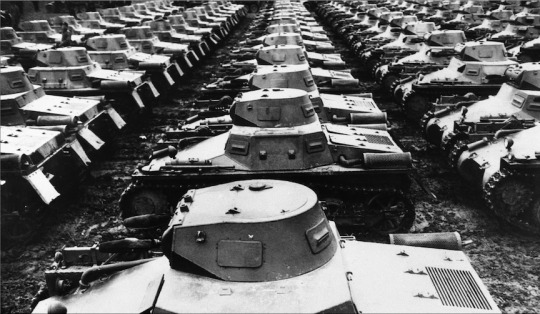
View On WordPress
#Alan Dunn#Clifton Fadiman#College football 1930s#Columbia Lions 1933#E.B. White#Florence Finch Kelly#German rearmament 1930s#Harry Brown#Helen Hokinson#Henry Anton#Howard Brubaker#I. Klein#Inter-Parliamentary Union#James Thurber
0 notes
Photo
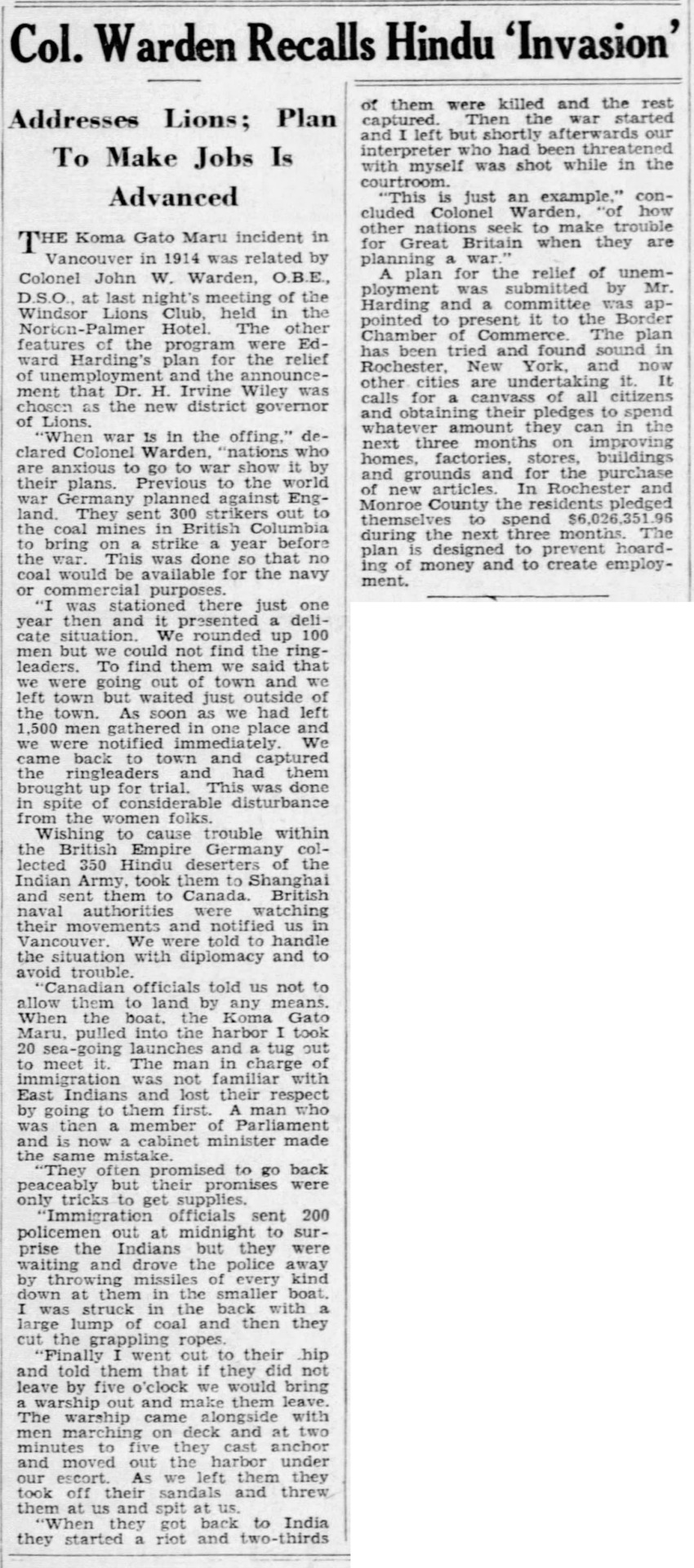
“Col. Warden Recalls Hindu 'Invasion’,” Border Cities Star. February 16, 1933. Page 5.
----
Addresses Lions; Plan To Make Jobs Is Advanced
----
THE Koma Gato Maru incident in Vancouver in 1914 was related by Colonel John W. Warden, O.B.E., D S O., at last night's meeting of the Windsor Lions Club, held in the Norton-Palmer Hotel. The other features of the program were Edward Harding's plan for the relief of unemployment and the announcement that Dr. H. Irvine Wiley was chosen as the new district governor of Lions.
'"When war is in the offing," declared Colonel Warden, "nations who are anxious to go to war show it by their plans. Previous to the world war Germany planned against England. They sent 300 strikers out to the coal mines in British Columbia to bring on a strike a year before the war. This was done so that no coal would be available for the navy or commercial purposes.
"I was stationed there just one year then and it presented a delicate situation. We rounded up 100 men but we could not find the ringleaders. To find them we said that we were going out of town and we left town but waited just outside of the town. As soon as we had left 1,500 men gathered in one place and we were notified immediately. We came back to town and captured the ringleaders and had them brought up for trial. This was done in spite of considerable disturbance from the women folks.
Wishing to cause trouble within the British Empire Germany collected 350 Hindu deserters of the Indian Army, took them to Shanghai and sent them to Canada. British naval authorities were watching their movements and notified us in Vancouver. We were told to handle the situation with diplomacy and to avoid trouble.
'Canadian officials told us not to allow them to land by any means. When the boat, the Koma Gato Maru, pulled into the harbor took 20 sea-going launches and a tug out to meet it. The man in charge of immigration was not familiar with East Indians and lost their respect by going to them first. A man who was then a member of Parliament and is now a cabinet minister made the same mistake.
"They often promised to go back peaceably but their promises were only tricks to get supplies. '"Immigration officials sent 200 policemen out at midnight to surprise the Indians but they were waiting and drove the police away by throwing missiles of every kind down at them in the smaller boat. I was struck in the back with a large lump of coal and then they cut the grappling ropes.
'"Finally I went out to their ship and told them that if they did not leave by five o'clock we would bring a warship out and make them leave. The warship came alongside with men marching on deck and at two minutes to five they cast anchor and moved out the harbor under our escort. As we left them they took off their sandals and threw, them at us and spit at us.
"When they got back to India they started a riot and two-thirds of them were killed and the rest captured. Then the war started and I left but shortly afterwards our interpreter who had been threatened with myself was shot while in the courtroom.
"This is just an example." concluded Colonel Warden, "of how other nations seek to make trouble for Great Britain when they are planning a war."
A plan for the relief of unemployment was submitted by Mr. Harding and a committee was appointed to present it to the Border Chamber of Commerce. The plan has been tried and found sound in Rochester, New York, and now other cities are undertaking it. It calls for a canvass of all citizens and obtaining their pledges to spend whatever amount they can in the next three months on improving homes, factories, stores, buildings and grounds and for the purchase of new articles. In Rochester and Monroe County the residents pledged themselves to spend $6.026.351.95 during the next three months. The plan is designed to prevent hoarding of money and to create employment.
[AL: A remarkable display of the racist, classist, conspiracy theorizing of the Canadian military and political elite, especially the ‘small fry’ of this class - local administrators, politicians, police, prison, military and capitalists, the powerful on a municipal or rural level, who can only understand events in their time as the acts of agitators and foreign enemies. It’s clearly a post-facto argument, too, sort of like The Simpsons’ Moe claiming ‘even when I knew it was the bears, I knew it was them [the immigrants].’ People like Warden opposed to Sikh immigration or strikers didn’t hide behind ‘imperial Germany did it’ at the time - they just argued that White Canada had to keep out the wrong colour and punish the labour agitator. The implication here, too, is that the unrest of the Great Depression was being caused by the Soviet Union.]
#komagata maru incident#komagata maru#vancouver#windsor#racism in canada#xenophobia in canada#conspiracy theory#canada in the british empire#local elites#lions club#prison officer#essex county jail#british raj#anti-immigrant sentiment#indian immigration to canada#great depression in canada
1 note
·
View note
Text
Events 5.17 (before 1970)
1395 – Battle of Rovine: The Wallachians defeat an invading Ottoman army.
1521 – Edward Stafford, 3rd Duke of Buckingham, is executed for treason.
1527 – Pánfilo de Narváez departs Spain to explore Florida with 600 men – by 1536 only four survive.
1536 – George Boleyn, 2nd Viscount Rochford and four other men are executed for treason.
1536 – Henry VIII and Anne Boleyn's marriage is annulled.
1590 – Anne of Denmark is crowned Queen of Scotland.
1642 – Paul de Chomedey, Sieur de Maisonneuve founds the Ville Marie de Montréal.
1648 – Emperor Ferdinand III defeats Maximilian I of Bavaria in the Battle of Zusmarshausen.
1673 – Louis Jolliet and Jacques Marquette begin exploring the Mississippi River.
1756 – Seven Years' War formally begins when Great Britain declares war on France
1760 – French forces besieging Quebec retreat after the Royal Navy arrives to relieve the British garrison.
1792 – The New York Stock Exchange is formed under the Buttonwood Agreement.
1805 – Muhammad Ali becomes Wāli of Egypt.
1809 – Emperor Napoleon I orders the annexation of the Papal States to the French Empire.
1814 – Occupation of Monaco changes from French to Austrian.
1814 – The Constitution of Norway is signed and Crown Prince Christian Frederick of Denmark is elected King of Norway by the Norwegian Constituent Assembly.
1859 – Members of the Melbourne Football Club codified the first rules of Australian rules football.
1863 – Rosalía de Castro publishes Cantares Gallegos, the first book in the Galician language.
1865 – The International Telegraph Union (later the International Telecommunication Union) is established in Paris.
1875 – Aristides wins the first Kentucky Derby with the jockey Oliver Lewis (2:37.75).
1900 – The children's novel The Wonderful Wizard of Oz, by L. Frank Baum, is first published in the United States. The first copy is given to the author's sister.
1902 – Greek archaeologist Valerios Stais discovers the Antikythera mechanism, an ancient mechanical analog computer.
1914 – The Protocol of Corfu is signed, recognising full autonomy to Northern Epirus under nominal Albanian sovereignty.
1915 – The last British Liberal Party government (led by H. H. Asquith) falls.
1933 – Vidkun Quisling and Johan Bernhard Hjort form Nasjonal Samling — the national-socialist party of Norway.
1937 – Spanish Civil War: The Largo Caballero government resigns in the wake of the Barcelona May Days, leading Juan Negrín to form a government, without the anarcho-syndicalist CNT, in its stead
1939 – The Columbia Lions and the Princeton Tigers play in the United States' first televised sporting event, a collegiate baseball game in New York City.
1940 – World War II: Germany occupies Brussels, Belgium.
1943 – World War II: Dambuster Raids commence by No. 617 Squadron RAF.
1953 – Delta Air Lines Flight 318 crashes near Marshall, Texas, killing 19.
1954 – The United States Supreme Court hands down a unanimous decision in Brown v. Board of Education of Topeka, Kansas, outlawing racial segregation in public schools.
1967 – Six-Day War: President Gamal Abdel Nasser of Egypt demands dismantling of the peace-keeping UN Emergency Force in Egypt.
1969 – Venera program: Soviet Venera 6 begins its descent into the atmosphere of Venus, sending back atmospheric data before being crushed by pressure.
0 notes
Text
10 Fun Facts About Lou Gehrig: The Iron Horse of Baseball (Part 1)
If you’re a fan of baseball, or just want to learn more about some of the greats, then you’ll want to read this blog post about Lou Gehrig. Lou Gehrig was one of the greatest baseball players of all time, and was known as the Iron Horse of Baseball for his incredible durability. In this blog post, we’ll discuss of the 10 Fun Facts About Lou Gehrig: The Iron Horse of Baseball that you may not know. We’ll talk about his career accomplishments, his personal life, and his legacy in the world of baseball. We’ll also discuss why Lou Gehrig was so beloved by his fans and why he’s still remembered today. By the end of this post, you’ll have a better understanding of this legendary baseball player and why he was so influential in the sport. So, grab a snack and get ready to learn some fun facts about Lou Gehrig!
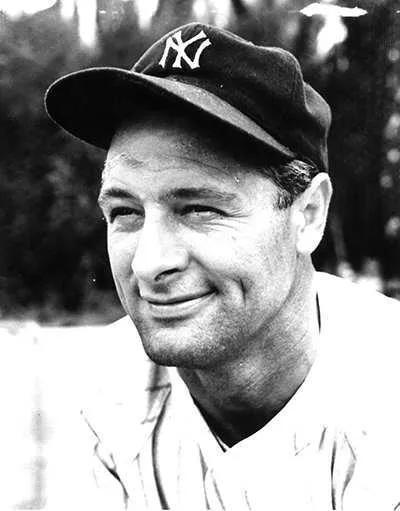
1. Lou Gehrig was born in New York City to German immigrant parents.
Lou Gehrig, born on June 19, 1903, in New York City, was the son of German immigrant parents. His father, Heinrich Gehrig, migrated from Germany to the United States in 1885. Lou Gehrig’s mother, Christina Fack, also came from a German family that had settled in the United States. Growing up, Gehrig was exposed to both German and English languages and cultures. This multicultural background influenced his upbringing and helped shape his identity as he went on to become one of the greatest baseball players in American history.
2. Gehrig initially attended Columbia University on a football scholarship but eventually shifted his focus to baseball.
Lou Gehrig initially attended Columbia University on a football scholarship. He was a promising football player and played as an end for the Columbia Lions. However, Gehrig’s passion for baseball soon took precedence, and he shifted his focus to the sport. He joined the Columbia baseball team and quickly gained recognition for his exceptional hitting skills. Gehrig’s talent on the baseball field eventually caught the attention of professional scouts, leading to his signing with the New York Yankees in 1923.
3. He earned the nickname “Iron Horse” due to his remarkable durability and consecutive games played streak.
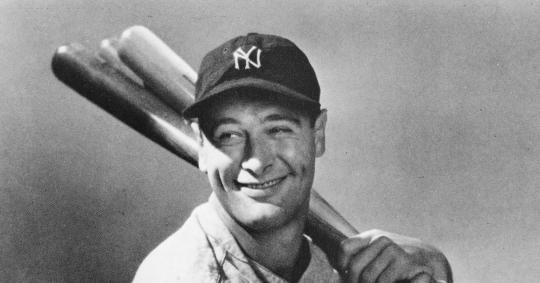
4. Gehrig once offered to bench himself during a game in 1933.
In 1933, Lou Gehrig, known for his exceptional consistency, offered to bench himself during a game. He felt that he was not performing up to his usual standards and approached the team manager, Joe McCarthy, with the suggestion of replacing him. However, McCarthy refused Gehrig’s offer and showed his faith in the player’s abilities by keeping him in the lineup. This incident highlights Gehrig’s humility and dedication to the team, as he was willing to prioritize the team’s success over his individual performance. Despite his self-doubt, Gehrig continued to contribute to the New York Yankees’ success and solidify his place as one of baseball’s greatest players.
5. Gehrig was known for his humility and modesty, often deflecting praise and highlighting the accomplishments of his teammates.
Lou Gehrig was widely known for his humility and modesty, characteristics that endeared him to fans and teammates alike. Despite his immense talent and numerous accomplishments, Gehrig consistently deflected praise and redirected attention towards his teammates. He believed in the power of teamwork and acknowledged the contributions of others. Gehrig often downplayed his individual success and instead focused on the collective achievements of the team. This humble and selfless attitude endeared him to both his peers and fans, solidifying his reputation not only as an exceptional athlete but also as a genuinely good person.
0 notes
Text
THREE LITTLE PIGSKINS
December 8, 1934
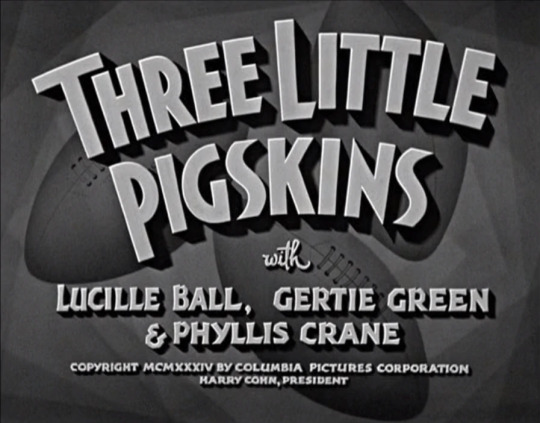
Three Little Pigskins is a 1934 Columbia Pictures short subject directed by Raymond McCarey and starring slapstick comedy team The Three Stooges. It is the fourth entry in the series starring the comedians, who released 190 short films for the studio between 1934 and 1959.
Synopsis ~ Moe, Larry and Curly are hired to promote a university football team. They're soon mistaken for the school's famous star athletes, "The Three Horsemen." As the star athletes, they are hired by a gangster to secretly play on his professional team, but of course the boys know nothing about football.

PRINCIPAL CAST

The Three Stooges were an American vaudeville and comedy team active from 1922 until 1970. Their hallmark was physical farce and slapstick. Six Stooges appeared over the act's run with only three active at any given time. In this film they are:
Moe Howard (Moe) born Moses Horwitz in 1897. Died 1975.
Larry Fine (Larry) born Larry Feinberg in 1902. Died 1975.
Curly Howard (Curly) born Jerome Horwitz in 1903, Moe’s younger brother. Died in 1952.
This short film is the only time the three worked with Lucille Ball.

Lucille Ball (Daisy Simms). This is Ball’s 17th film to be released since 1933. It is her 13th in 1934 alone.
Gertie Green (Lulu Banks) makes the third of her four screen appearances.
Phyllis Crane (Molly Gray) was also seen with Lucille Ball in Broadway Bill and Men of the Night, both in 1934.
UNCREDITED CAST (in alphabetical order)
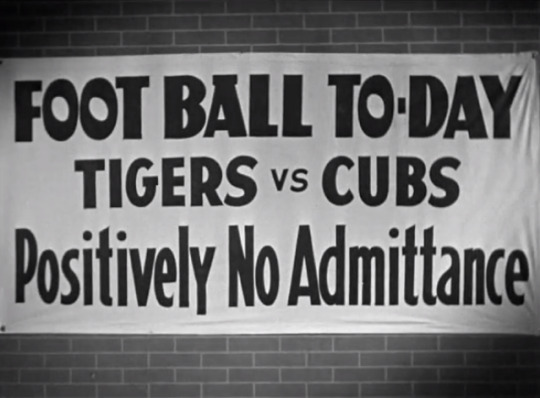
Harry Bowen (Boulder Dam PR Man) also appeared with Lucille Ball in The Whole Town’s Talking (1935) and Dummy Ache (1936).
Lynton Brent (1st Man Panhandled by Moe) appeared with Lucille Ball in seven other films between 1934 and 1939.
Bobby Burns (Man Panhandled by Larry) also appeared with Lucille Ball and Harry Bowen in Dummy Ache (1936).
Charles Dorety (2nd Photographer) also appeared with Lucille Ball in His Old Flame (1935).
Milton Douglas (Henchman) makes his only appearance with Lucille Ball.
Oscar ‘Dutch’ Hendrian (Referee) did five other films with Lucille Ball between 1934 and 1935.
William J. Irving (1st Photographer) did five other films with Lucille Ball between 1933 and 1935.
Johnny Kascier (Man Panhandled by Curly) makes his only appearance with Lucille Ball.
Walter Long (Joe Stacks) also appeared with Lucille Ball in The Whole Town’s Talking (1935).
Roger Moore (Pete, Joe’s Henchman) also appeared with Lucille Ball in Meet the People (1944) and The Fuller Brush Girl (1950).
The role of Joe is sometimes attributed to Joseph Young.
Jimmy Phillips (2nd Man Panhandled by Moe) also appeared with Lucille Ball in The Whole Town’s Talking (1935)
Larry Wheat (3rd Man Panhandled by Moe) appeared with Lucille Ball in Thousands Cheer (1943).
PIGSKIN TRIVIA

Three Little Pigskins was filmed from October 25 to 30, 1934 in and around Los Angeles.

The film's title is a multiple pun, derived from the children’s nursery rhyme the Three Little Pigs, along with ‘pigskin’ being a synonym for a football.
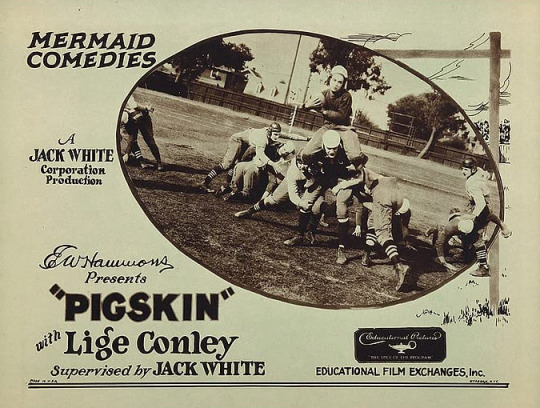
In 1924, Mermaid Comedies produced Pigskin, starring silent comedy short starring Lige Conley.
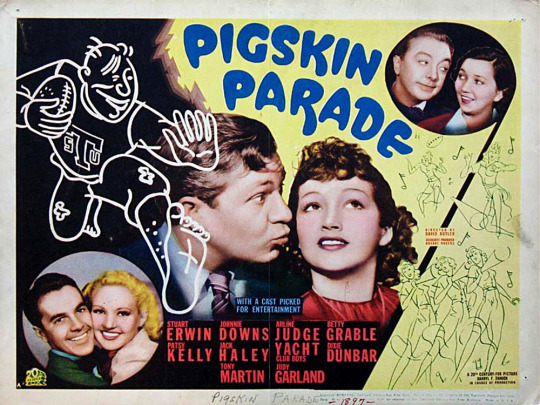
In 1936 a film titled Pigskin Parade premiered earning its leading man an Oscar nomination.

The second half of the film was shot at Gilmore Stadium, and its name on the scoreboard appears in several shots. The Los Angeles stadium was newly built in 1934 and had a seating capacity of 18,000. The football team the Stooges play against was from Loyola Marymount University, a regular tenant of Gilmore Stadium.
The Cubs on the scoreboard refers to the Westwood Cubs, who had played at the stadium on the October 28, 1934. The Tigers refers to the Occidental Tigers, a college team from Los Angeles. Neither team appears in the film.
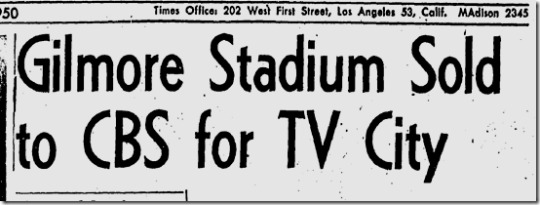
Coincidentally, the stadium was demolished in 1952 to make way for CBS Television City, a production facility that was opened by Lucille Ball as the network’s reigning star, although “I Love Lucy” never filmed there. One of their major tenants was the Hollywood Stars Baseball team, which Fred Mertz mentions during “In Palm Springs” (ILL S4;E26) in March 1955.
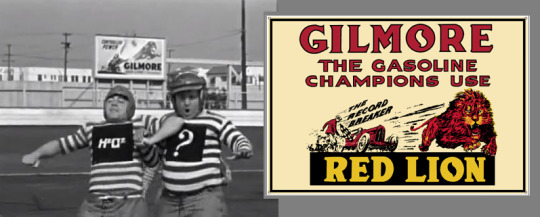
There is also a shot that includes a billboard for Gilmore Oil, including its trademark symbol, a red lion. The Gilmore Oil Company was an independent oil company in California founded by Arthur Fremont Gilmore, whom the stadium was named for. At its peak, they operated over three thousand gas stations on the West Coast. In the 1940s, the company was acquired and then merged into a group which eventually became Mobil.

The address 6317 Yucca Street on the poster behind Curly and Moe was the actual location of filming. Coincidentally, it is about a quarter mile from the Stooges’ Star on the Hollywood Walk of Fame. the location is now the Los Angeles campus of The American Musical and Dramatic Academy (AMDA).

Boulder Dam College is a fictional school. Boulder Dam is located in Clark County, Nevada and was under construction at the time of filming. It named Boulder Dam in 1933 and dedicated in 1935 and opened in 1936. It was renamed Hoover Dam in 1946.

Beyond the stadium can be glimpsed the Fairfax Theatre sign. The Fairfax Theatre opened in 1930 as part of a larger retail complex. The theatre was ‘triplexed’ in the 1980s but closed for good in 2010 after roof damage from heavy rains. The owner was unwilling to make repairs although the façade still remains.

Later in her career, Lucille Ball (apparently referring to the seltzer squirting scene) would remark,
"The only thing I learned from The Three Stooges was how to duck. I still got wet!"
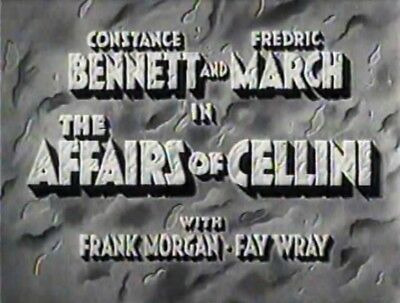
While Lucille Ball was filming Three Little Pigskins, The Affairs of Cellini, in which she played an uncredited lady in waiting, was in wide release, having premiered in late August 1934.

Moe Howard once called Three Little Pigskins "a humdinger of bangs and bruises," as it marked the first time the Stooges flatly refused to perform a stunt. In the film, during the game the boys are stopped by photographers to pose for a picture, when the football players then tackle them. The team consisted of genuine college football players, and the Stooges were afraid of being hurt. Larry Fine, the smallest and lightest of the three, told director Raymond McCarey, “We've never used stunt doubles before but we certainly need them now."

The fact that both Curly and Larry had been hurt a few days earlier (Curly broke his leg riding down the dumbwaiter and Larry lost a tooth due to a mistimed punch) reinforced the trio's decision to opt out of the scene. Less than an hour after the exchange, the studio found three stunt doubles made up to look like the Stooges. Two of the three were seriously injured as were all four photographers.
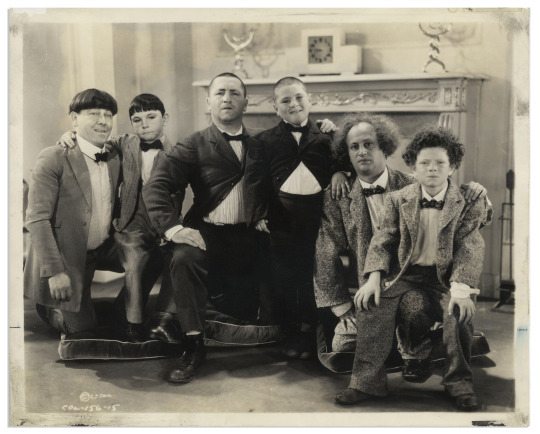
A planned concluding scene had the Stooges, years later, telling the story to their sons. It is unknown if this scene was ever filmed, but publicity photos exist of the Stooges, each with a young actor, all made up and dressed to resemble their older counterparts.

In 1996, Exclusive Premiere created limited edition action figures of the Stooges in costumes from the film.
PIGSKIN PROGRESS
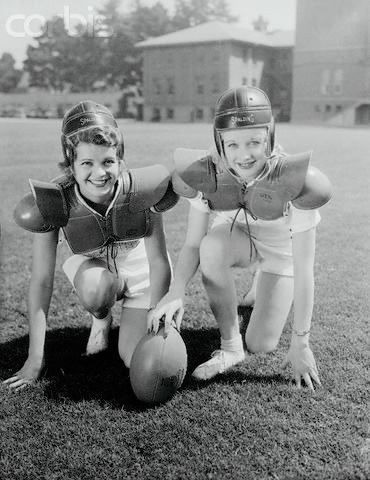
As a young model and actress, Lucille Ball didn’t just take film jobs. Here she poses with Billie Seward at Bovard Field in Los Angeles.
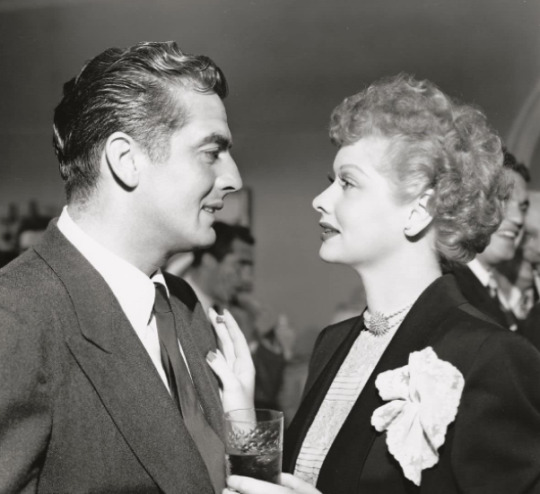
In 1949, Lucille Ball and Victor Mature starred in a film about a professional football player, Easy Living.

Ball’s radio show “My Favorite Husband” tackled gridiron gimmickry in 1950.
For a further look at Lucy and the Gridiron, click here!
23 notes
·
View notes
Text
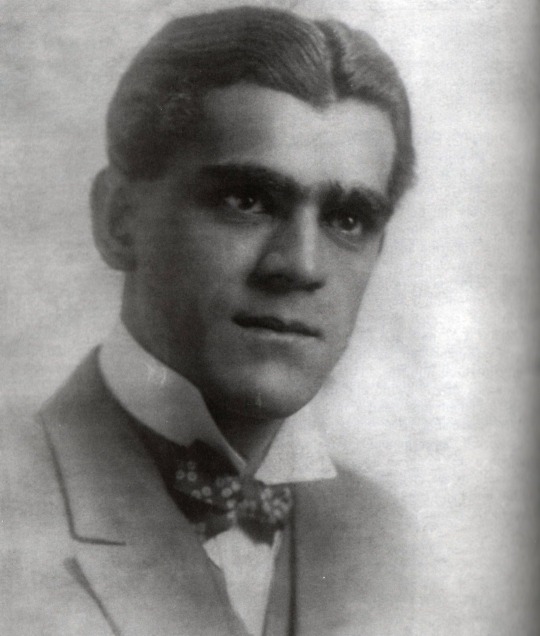
William Henry Pratt (23 November 1887 – 2 February 1969), better known by his stage name Boris Karloff was an English actor who was primarily known for his roles in horror films. He portrayed Frankenstein's monster in Frankenstein (1931), Bride of Frankenstein (1935) and Son of Frankenstein (1939). He also appeared as Imhotep in The Mummy (1932).
In non-horror roles, he is best known to modern audiences for narrating and as the voice of the Grinch in the animated television special of Dr. Seuss' How the Grinch Stole Christmas! (1966). For his contribution to film and television, Karloff was awarded two stars on the Hollywood Walk of Fame.
Karloff was born William Henry Pratt on 23 November 1887,[2] at 36 Forest Hill Road, Dulwich, Surrey (now London), England. His parents were Edward John Pratt, Jr. and Eliza Sarah Millard. His brother, Sir John Thomas Pratt, was a British diplomat. Edward John Pratt, Jr. was an Anglo-Indian, from a British father and Indian mother, while Karloff's mother also had some Indian ancestry, thus Karloff had a relatively dark complexion that differed from his peers at the time. His mother's maternal aunt was Anna Leonowens, whose tales about life in the royal court of Siam (now Thailand) were the basis of the musical The King and I. Pratt was bow-legged, had a lisp, and stuttered as a young boy.[7] He learned how to manage his stutter, but not his lisp, which was noticeable throughout his career in the film industry.
Pratt spent his childhood years in Enfield, in the County of Middlesex. He was the youngest of nine children, and following his mother's death was brought up by his elder siblings. He received his early education at Enfield Grammar School, and later at the public schools of Uppingham School and Merchant Taylors' School. After this, he attended King's College London where he took studies aimed at a career with the British Government's Consular Service. However, in 1909, he left university without graduating and drifted, departing England for Canada, where he worked as a farm labourer and did various odd itinerant jobs until happening upon acting.
Pratt began appearing in theatrical performances in Canada, and during this period he chose Boris Karloff as his stage name. Some have theorised that he took the stage name from a mad scientist character in the novel The Drums of Jeopardy called "Boris Karlov". However, the novel was not published until 1920, at least eight years after Karloff had been using the name on stage and in silent films, opening the possibility that the Karlov character might have been named after Karloff after the novel's author noticed it in a cast listing and liked the sound of it rather than simply being a coincidence. Warner Oland played "Boris Karlov" in a film version in 1931. Another possible influence was thought to be a character in the Edgar Rice Burroughs fantasy novel H. R. H. The Rider which features a "Prince Boris of Karlova", but as the novel was not published until 1915, the influence may be backward, that Burroughs saw Karloff in a play and adapted the name for the character. Karloff always claimed he chose the first name "Boris" because it sounded foreign and exotic, and that "Karloff" was a family name (from Karlov—in Cyrillic, Карлов—a name found in several Slavic countries, including Russia, Ukraine and Bulgaria).
Karloff's daughter, Sara, publicly denied any knowledge of Slavic forebears, "Karloff" or otherwise. One reason for the name change was to prevent embarrassment to his family. Whether or not his brothers (all dignified members of the British Foreign Service) actually considered young William the "black sheep of the family" for having become an actor, Karloff apparently worried they felt that way. He did not reunite with his family until he returned to Britain to make The Ghoul (1933), extremely worried that his siblings would disapprove of his new, macabre claim to world fame. Instead, his brothers jostled for position around him and happily posed for publicity photographs. After the photo was taken, Karloff's brothers immediately started asking about getting a copy of their own. The story of the photo became one of Karloff's favorites.
Karloff joined the Jeanne Russell Company in 1911 and performed in towns like Kamloops (British Columbia) and Prince Albert (Saskatchewan). After the devastating tornado in Regina on 30 June 1912, Karloff and other performers helped with clean-up efforts. He later took a job as a railway baggage handler and joined the Harry St. Clair Co. that performed in Minot, North Dakota, for a year in an opera house above a hardware store.
Whilst he was trying to establish his acting career, Karloff had to perform years of manual labour in Canada and the U.S. in order to make ends meet. He was left with back problems from which he suffered for the rest of his life. Because of his health, he did not enlist in World War I.
During this period, Karloff worked in various theatrical stock companies across the U.S. to hone his acting skills. Some acting companies mentioned were the Harry St. Clair Players and the Billie Bennett Touring Company. By early 1918 he was working with the Maud Amber Players in Vallejo, California, but because of the Spanish Flu outbreak in the San Francisco area and the fear of infection, the troupe was disbanded. He was able to find work with the Haggerty Repertory for a while (according to the 1973 obituary of Joseph Paul Haggerty, he and Boris Karloff remained lifelong friends). According to Karloff, in his first film he appeared as an extra in a crowd scene for a Frank Borzage picture at Universal for which he received $5; the title of this film has never been traced.
Once Karloff arrived in Hollywood, he made dozens of silent films, but this work was sporadic, and he often had to take up manual labour such as digging ditches or delivering construction plaster to earn a living.
His first on screen role was in a film serial, The Lightning Raider (1919) with Pearl White. He was in another serial, The Masked Rider (1919), the first of his appearances to survive.
Karloff could also be seen in His Majesty, the American (1919) with Douglas Fairbanks, The Prince and Betty (1919), The Deadlier Sex (1920), and The Courage of Marge O'Doone (1920). He played an Indian in The Last of the Mohicans (1920) and he would often be cast as an Arab or Indian in his early films.
Karloff's first major role came in a film serial, The Hope Diamond Mystery (1920). He was Indian in Without Benefit of Clergy (1921) and an Arab in Cheated Hearts (1921) and villainous in The Cave Girl (1921). He was a maharajah in The Man from Downing Street (1922), a Nabob in The Infidel (1922) and had roles in The Altar Stairs (1922), Omar the Tentmaker (1922) (as an Imam), The Woman Conquers (1922), The Gentleman from America (1923), The Prisoner (1923) and the serial Riders of the Plains (1923).
Karloff did a Western, The Hellion (1923), and a drama, Dynamite Dan (1924). He could be seen in Parisian Nights (1925), Forbidden Cargo (1925), The Prairie Wife (1925) and the serial Perils of the Wild (1925).
Karloff went back to bit part status in Never the Twain Shall Meet (1925) directed by Maurice Tourneur but he had a good support role in Lady Robinhood (1925).
Karloff went on to be in The Greater Glory (1926), Her Honor, the Governor (1926), The Bells (1926) (as a mesmerist), The Nickel-Hopper (1926), The Golden Web (1926), The Eagle of the Sea (1926), Flames (1926), Old Ironsides (1926), Flaming Fury (1926), Valencia (1926), The Man in the Saddle (1926), Tarzan and the Golden Lion (1927) (as an African), Let It Rain (1927), The Meddlin' Stranger (1927), The Princess from Hoboken (1927), The Phantom Buster (1927), and Soft Cushions (1927).
Karloff had roles in Two Arabian Knights (1927), The Love Mart (1927), The Vanishing Rider (1928) (a serial), Burning the Wind (1928), Vultures of the Sea (1928), and The Little Wild Girl (1928).
He was in The Devil's Chaplain (1929), The Fatal Warning (1929) for Richard Thorpe, The Phantom of the North (1929), Two Sisters (1929), Anne Against the World (1929), Behind That Curtain (1929), and The King of the Kongo (1929), a serial directed by Thorpe.
Karloff had an uncredited bit part in The Unholy Night (1930) directed by Lionel Barrymore, and bigger parts in The Bad One (1930),The Sea Bat (1930) (directed by Barrymore), and The Utah Kid (1930) directed by Thorpe.
A film which brought Karloff recognition was The Criminal Code (1931), a prison drama directed by Howard Hawks in which he reprised a dramatic part he had played on stage. In the same period, Karloff had a small role as a mob boss in Hawks' gangster film Scarface, but the film was not released until 1932 because of difficult censorship issues.
He did another serial for Thorpe, King of the Wild (1931), then had support parts in Cracked Nuts (1931), Young Donovan's Kid (1931), Smart Money (1931), The Public Defender (1931), I Like Your Nerve (1931), and Graft (1931).
Another significant role in the autumn of 1931 saw Karloff play a key supporting part as an unethical newspaper reporter in Five Star Final, a film about tabloid journalism which was nominated for the Academy Award for Best Picture.
He could also be seen in The Yellow Ticket (1931) The Mad Genius (1931), The Guilty Generation (1931) and Tonight or Never (1931).
Karloff acted in eighty movies before being found by James Whale and cast in Frankenstein (1931). Karloff's role as Frankenstein's monster was physically demanding – it necessitated a bulky costume with four-inch platform boots – but the costume and extensive makeup produced a lasting image. The costume was a job in itself for Karloff with the shoes weighing 11 pounds (5.0 kg) each.[13] Universal Studios quickly copyrighted the makeup design for the Frankenstein monster that Jack P. Pierce had created.
It took a while for Karloff's stardom to be established with the public – he had small roles in Behind the Mask (1932), Business and Pleasure (1932) and The Miracle Man (1932).
As receipts for Frankenstein and Scarface flooded in, Universal gave Karloff third billing in Night World (1932), with Lew Ayres, Mae Clarke and George Raft.
Karloff was reunited with Whale at Universal for The Old Dark House (1932), a horror movie based on the novel Benighted by J.B. Priestley, in which he finally enjoyed top billing above Melvyn Douglas, Charles Laughton, Raymond Massey and Gloria Stuart. He was loaned to MGM to play the titular role in The Mask of Fu Manchu (also 1932), for which he gained top billing.
Back at Universal, he was cast as Imhotep who is revived in The Mummy (1932). It was as successful at the box-office as the other two films and Karloff was now established as a star of horror films.
Karloff returned to England to star in The Ghoul (1933), then made a non-horror film for John Ford, The Lost Patrol (1934), where his performance was highly acclaimed.
Karloff was third billed in the Twentieth Century Pictures historical film The House of Rothschild (1934) with George Arliss, which was highly popular.
Horror, however, had now become Karloff's primary genre, and he gave a string of lauded performances in Universal's horror films, including several with Bela Lugosi, his main rival as heir to Lon Chaney's status as the leading horror film star. While the long-standing, creative partnership between Karloff and Lugosi never led to a close friendship, it produced some of the actors' most revered and enduring productions, beginning with The Black Cat (1934) and continuing with Gift of Gab (1934), in which both had cameos. Karloff reprised the role of Frankenstein's monster in Bride of Frankenstein (1935) for James Whale. Then he and Lugosi were reunited for The Raven (1935).
For Columbia, Karloff made The Black Room (1935) then he returned to Universal for The Invisible Ray (1936) with Lugosi, more a science fiction film. Karloff was then cast in a Warner Bros. horror film, The Walking Dead (1936).
Because the Motion Picture Production Code (known as the Hays Code) began to be seriously enforced in 1934, horror films suffered a decline in the second half of the 1930s. Karloff worked in other genres, making two films in Britain, Juggernaut (1936) and The Man Who Changed His Mind (1936).
He returned to Hollywood to play a supporting role in Charlie Chan at the Opera (1936) then did a science fiction film, Night Key (1937).
At Warners, he did two films with John Farrow, playing a Chinese warlord in West of Shanghai (1937) and a murder suspect in The Invisible Menace (1938).
Karloff went to Monogram to play the title role of a Chinese detective in Mr. Wong, Detective (1938), which led to a series. Karloff's portrayal of the character is an example of Hollywood's use of yellowface and its portrayal of East Asians in the earlier half of the 20th century. He had another heroic role in Devil's Island (1939).
Universal found reissuing Dracula and Frankenstein led to success at the box-office and began to produce horror films again starting with Son of Frankenstein (1939). Karloff reprised his role, with Lugosi co starring as Ygor and Basil Rathbone as Frankenstein.
After The Mystery of Mr. Wong (1939) and Mr. Wong in Chinatown (1939) he signed a three-picture deal with Columbia, starting with The Man They Could Not Hang (1939). Karloff returned to Universal to make Tower of London (1939) with Rathbone, playing the murderous henchman of King Richard III.
Karloff made a fourth Mr Wong film at Monogram The Fatal Hour (1940). At Warners he was in British Intelligence (1940), then he went to Universal to do Black Friday (1940) with Lugosi.
Karloff's second and third films for Columbia were The Man with Nine Lives (1940) and Before I Hang (1940). In between he did a fifth and final Mr Wong film, Doomed to Die (1940).
Karloff appeared at a celebrity baseball game as Frankenstein's monster in 1940, hitting a gag home run and making catcher Buster Keaton fall into an acrobatic dead faint as the monster stomped into home plate.
Karloff finished a six picture commitment with Monogram with The Ape (1940). He and Lugosi appeared in a comedy at RKO, You'll Find Out (1941), then he went to Columbia for The Devil Commands (1941) and The Boogie Man Will Get You (1941).
An enthusiastic performer, he returned to the Broadway stage in the original production of Arsenic and Old Lace in 1941, in which he played a homicidal gangster enraged to be frequently mistaken for Karloff. Frank Capra cast Raymond Massey in the 1944 film, which was shot in 1941, while Karloff was still appearing in the role on Broadway. The play's producers allowed the film to be made conditionally: it was not to be released until the production closed. (Karloff reprised his role on television in the anthology series The Best of Broadway (1955), and with Tony Randall and Tom Bosley in a 1962 production on the Hallmark Hall of Fame. He also starred in a radio adaptation produced by Screen Guild Theatre in 1946.)
In 1944, he underwent a spinal operation to relieve a chronic arthritic condition.
Karloff returned to film roles in The Climax (1944), an unsuccessful attempt to repeat the success of Phantom of the Opera (1943). More liked was House of Frankenstein (1944), where Karloff played the villainous Dr. Niemann and the monster was played by Glenn Strange.
Karloff made three films for producer Val Lewton at RKO: The Body Snatcher (1945), his last teaming with Lugosi, Isle of the Dead (1945) and Bedlam (1946).
In a 1946 interview with Louis Berg of the Los Angeles Times, Karloff discussed his arrangement with RKO, working with Lewton and his reasons for leaving Universal. Karloff left Universal because he thought the Frankenstein franchise had run its course; the entries in the series after Son of Frankenstein were B-pictures. Berg wrote that the last installment in which Karloff appeared—House of Frankenstein—was what he called a " 'monster clambake,' with everything thrown in—Frankenstein, Dracula, a hunchback and a 'man-beast' that howled in the night. It was too much. Karloff thought it was ridiculous and said so." Berg explained that the actor had "great love and respect for" Lewton, who was "the man who rescued him from the living dead and restored, so to speak, his soul."
Horror films experienced a decline in popularity after the war, and Karloff found himself working in other genres.
For the Danny Kaye comedy, The Secret Life of Walter Mitty (1947), Karloff appeared in a brief but starring role as Dr. Hugo Hollingshead, a psychiatrist. Director Norman Z. McLeod shot a sequence with Karloff in the Frankenstein monster make-up, but it was deleted from the finished film.
Karloff appeared in a film noir, Lured (1947), and as an Indian in Unconquered (1947). He had support roles in Dick Tracy Meets Gruesome (1947), Tap Roots (1948), and Abbott and Costello Meet the Killer, Boris Karloff.
During this period, Karloff was a frequent guest on radio programmes, whether it was starring in Arch Oboler's Chicago-based Lights Out productions (including the episode "Cat Wife") or spoofing his horror image with Fred Allen or Jack Benny. In 1949, he was the host and star of Starring Boris Karloff, a radio and television anthology series for the ABC broadcasting network.
He appeared as the villainous Captain Hook in Peter Pan in a 1950 stage musical adaptation which also featured Jean Arthur.
Karloff returned to horror films with The Strange Door (1951) and The Black Castle (1952).
He was nominated for a Tony Award for his work opposite Julie Harris in The Lark, by the French playwright Jean Anouilh, about Joan of Arc, which was reprised on Hallmark Hall of Fame.
During the 1950s, he appeared on British television in the series Colonel March of Scotland Yard, in which he portrayed John Dickson Carr's fictional detective Colonel March, who was known for solving apparently impossible crimes. Christopher Lee appeared alongside Karloff in the episode "At Night, All Cats are Grey" broadcast in 1955.[17] A little later, Karloff co-starred with Lee in the film Corridors of Blood (1958).
Karloff appeared in Abbott and Costello Meet Dr. Jekyll and Mr. Hyde (1952) and visited Italy for The Island Monster (1954) and India for Sabaka (1954).
Karloff, along with H. V. Kaltenborn, was a regular panelist on the NBC game show, Who Said That? which aired between 1948 and 1955. Later, as a guest on NBC's The Gisele MacKenzie Show, Karloff sang "Those Were the Good Old Days" from Damn Yankees while Gisele MacKenzie performed the solo, "Give Me the Simple Life". On The Red Skelton Show, Karloff guest starred along with actor Vincent Price in a parody of Frankenstein, with Red Skelton as "Klem Kadiddle Monster". He served as host and frequent star of the anthology series The Veil (1958) which was never broadcast due to financial problems at the producing studio; the complete series was rediscovered in the 1990s.
Karloff made some horror films in the late 1950s: Voodoo Island (1957), The Haunted Strangler (1958), Frankenstein 1970 (1958) (as the Baron), and Corridors of Blood (1958). In the "mad scientist" role in Frankenstein 1970 as Baron Victor von Frankenstein II, the grandson of the original creator. In the finale, it is revealed that the crippled Baron has given his own face to the monster. Karloff donned the monster make-up for the last time in 1962 for a Halloween episode of the TV series Route 66, which also featured Peter Lorre and Lon Chaney, Jr.
During this period, he hosted and acted in a number of television series, including Thriller and Out of This World.
Karloff appeared in Black Sabbath (1963) directed by Mario Bava. He made The Raven (1963) for Roger Corman and American International Pictures (AIP). Corman used Karloff in The Terror (1963) playing a baron who murdered his wife. He made a cameo in AIP's Bikini Beach (1964) and had a bigger role in that studio's The Comedy of Terrors (1964), directed by Jacques Tourneur and Die, Monster, Die! (1965). British actress Suzan Farmer, who played his daughter in the film, later recalled Karloff was aloof during production "and wasn’t the charming personality people perceived him to be".
In 1966, Karloff also appeared with Robert Vaughn and Stefanie Powers in the spy series The Girl from U.N.C.L.E., in the episode "The Mother Muffin Affair," Karloff performed in drag as the titular character.
That same year, he also played an Indian Maharajah on the installment of the adventure series The Wild Wild West titled "The Night of the Golden Cobra".
In 1967, he played an eccentric Spanish professor who believes himself to be Don Quixote in a whimsical episode of I Spy titled "Mainly on the Plains".
Karloff's last film for AIP was The Ghost in the Invisible Bikini (1967).
In the mid-1960s, he enjoyed a late-career surge in the United States when he narrated the made-for-television animated film of Dr. Seuss' How the Grinch Stole Christmas, and also provided the voice of the Grinch, although the song "You're a Mean One, Mr. Grinch" was sung by the American voice actor Thurl Ravenscroft. The film was first broadcast on CBS-TV in 1966. Karloff later received a Grammy Award for "Best Recording For Children" after the recording was commercially released. Because Ravenscroft (who never met Karloff in the course of their work on the show) was uncredited for his contribution to How the Grinch Stole Christmas!, his performance of the song was often mistakenly attributed to Karloff.
He appeared in Mad Monster Party? (1967) and starred in the second feature film of the British director Michael Reeves,The Sorcerers (1966).
Karloff starred in Targets (1968), a film directed by Peter Bogdanovich, featuring two separate stories that converge into one. In one, a disturbed young man kills his family, then embarks on a killing spree. In the other, a famous horror-film actor contemplates then confirms his retirement, agreeing to one last appearance at a drive-in cinema. Karloff starred as the retired horror film actor, Byron Orlok, a thinly disguised version of himself; Orlok was facing an end of life crisis, which he resolved through a confrontation with the gunman at the drive-in cinema.
Around the same time, he played occult expert Professor Marsh in a British production titled The Crimson Cult (Curse of the Crimson Altar, also 1968), which was the last Karloff film to be released during his lifetime.
He ended his career by appearing in four low-budget Mexican horror films: Isle of the Snake People, The Incredible Invasion, Fear Chamber and House of Evil. This was a package deal with Mexican producer Luis Enrique Vergara. Karloff's scenes were directed by Jack Hill and shot back-to-back in Los Angeles in the spring of 1968. The films were then completed in Mexico. All four were released posthumously, with the last, The Incredible Invasion, not released until 1971, two years after Karloff's death. Cauldron of Blood, shot in Spain in 1967 and co-starring Viveca Lindfors, was also released after Karloff's death.
While shooting his final films, Karloff suffered from emphysema. Only half of one lung was still functioning and he required oxygen between takes.
He recorded the title role of Shakespeare's Cymbeline for the Shakespeare Recording Society (Caedmon Audio). The recording was originally released in 1962. A download of his performance is available from audible.com. He also recorded the narration for Sergei Prokofiev's Peter and the Wolf with the Vienna State Opera Orchestra under Mario Rossi.
Records he made for the children's market included Three Little Pigs and Other Fairy Stories, Tales of the Frightened (volume 1 and 2), Rudyard Kipling's Just So Stories and, with Cyril Ritchard and Celeste Holm, Mother Goose Nursery Rhymes, and Lewis Carroll's The Hunting of the Snark.
Karloff was credited for editing several horror anthologies, commencing with Tales of Terror (Cleveland and NY: World Publishing Co, 1943) (compiled with the help of Edmond Speare). This wartime-published anthology went through at least five printings to September 1945. It has been reprinted recently (Orange NJ: Idea Men, 2007). Karloff's name was also attached to And the Darkness Falls (Cleveland and NY: World Publishing Co, 1946); and The Boris Karloff Horror Anthology (London: Souvenir Press, 1965; simultaneous publication in Canada - Toronto: The Ryerson Press; US pbk reprint NY: Avon Books, 1965 retitled as Boris Karloff's Favourite Horror Stories; UK pbk reprints London: Corgi, 1969 and London: Everest, 1975, both under the original title), though it is less clear whether Karloff himself actually edited these.
Tales of the Frightened (Belmont Books, 1963), though based on the recordings by Karloff of the same title, and featuring his image on the book cover, contained stories written by Michael Avallone; the second volume, More Tales of the Frightened, contained stories authored by Robert Lory. Both Avallone and Lory worked closely with Canadian editor and book packager Lyle Kenyon Engel, who also ghost-edited a horror story anthology for horror film star Basil Rathbone.
Beginning in 1940, Karloff dressed as Father Christmas every Christmas to hand out presents to physically disabled children in a Baltimore hospital.
He never legally changed his name to "Boris Karloff." He signed official documents "William H. Pratt, a.k.a. Boris Karloff."
He was a charter member of the Screen Actors Guild, and he was especially outspoken due to the long hours he spent in makeup while playing Frankenstein's Monster.
He married six times and had one child, daughter Sara Karloff, by fifth wife Dorothy Stine. His final marriage was in 1946 right after his fifth divorce. At the time of his daughter's birth, he was filming Son of Frankenstein and reportedly rushed from the film set to the hospital while still in full makeup.
He was an early member of the Hollywood Cricket Club.
Upon returning to England in 1959, his address was 43 Cadogan Square, London. In 1966, he bought 25 Campden House (in 29 Sheffield Terrace), Kensington W8, and 'Roundabout Cottage' in the Hampshire village of Bramshott. A longtime heavy smoker, he had emphysema which left him with only half of one lung still functioning. He contracted bronchitis in 1968 and was hospitalised at University College Hospital. He died of pneumonia at the King Edward VII Hospital, Midhurst, in Sussex, on 2 February 1969, at the age of 81.
His body was cremated following a requested modest service at Guildford Crematorium, Godalming, Surrey, where he is commemorated by a plaque in the Garden of Remembrance. A memorial service was held at St Paul's, Covent Garden (the Actors' Church), London, where there is also a plaque.
During the run of Thriller, Karloff lent his name and likeness to a comic book for Gold Key Comics based upon the series. After Thriller was cancelled, the comic was retitled Boris Karloff's Tales of Mystery. An illustrated likeness of Karloff continued to introduce each issue of this publication for more than a decade after his death; the comic lasted until the early 1980s. In 2009, Dark Horse Comics began publishing reprints of Boris Karloff's Tales of Mystery in a hard-bound edition.
For his contribution to film and television, Boris Karloff was awarded two stars on the Hollywood Walk of Fame, at 1737 Vine Street for motion pictures, and 6664 Hollywood Boulevard for television.[36] Karloff was featured by the U.S. Postal Service as Frankenstein's Monster and the Mummy in its series "Classic Monster Movie Stamps" issued in September 1997. In 1998, an English Heritage blue plaque was unveiled in his hometown in London. The British film magazine Empire in 2016 ranked Karloff's portrayal as Frankenstein's monster the sixth-greatest horror movie character of all time.
On June 25, 2019, The New York Times Magazine listed Boris Karloff among hundreds of artists whose material was reportedly destroyed in the 2008 Universal fire.
#boris karloff#silent era#silent hollywood#silent movie stars#golden age of hollywood#classic movie stars#classic hollywood#1910s movies#1920s hollywood#1930s hollywood#1940s hollywood#1950s hollywood#1960s hollywood#classic horror#horror icons#frankenstein#the mummy#hollywood legend
8 notes
·
View notes
Text
Men of a Certain Age: 50 States of Denial
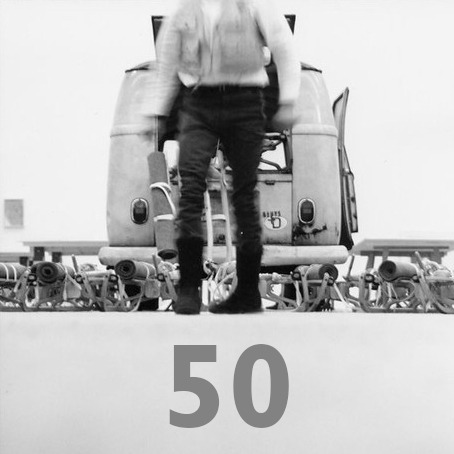
https://www.mixcloud.com/epicharmus/men-of-a-certain-age-50-states-of-denial/
1971
Astor Piazzolla (born in 1921) y Su Quinteto
“Primavera porteña (nueva versión)”
From Concierto para quinteto (RCA Victor)
Released in 1971
1972
Ravi Shankar and Ali Akbar Khan (born in 1922)
"Raga Sindhi Bhairavi" (excerpt)
From In Concert 1972 (Apple)
Recorded live in 1972; released in 1973
1973
The Modern Jazz Quartet (feat. Milt Jackson, born in 1923)
"Regret?"
From Blues on Bach (Atlantic)
Recorded in 1973; released in 1974
1974
Chet Atkins (born in 1924) and Merle Travis
"Boogie for Cecil"
From The Atkins-Travis Traveling Show (RCA Victor)
Recorded and released in 1974
1975
B. B. King (born in 1925)
"Lucille Talks Back (Copulation)"
From Lucille Talks Back (ABC)
Released in 1975
1976
Tony Bennett (born in 1926) and Bill Evans
"A Child is Born"
From Together Again (Improv)
Recorded in 1976; released in 1977
1977
Ralph Stanley (born in 1927) and the Clinch Mountain Boys
"Oh Death"
From Clinch Mountain Gospel (Rebel)
Recorded and released in 1977
1978
Serge Gainsbourg (born in 1928)
"Sea, Sex, and Sun"
7" single A side (Philips)
Released in 1978
1979
Chet Baker (born in 1929) and Wolfgang Lackerschmid
"Five Years Ago"
From Ballads for Two (Sandra Music Productions)
Recorded and released in 1979
1980
Ray Charles (born in 1930)
“Compared To What”
From Brother Ray Is at It Again (Atlantic)
Released in 1980
1981
George Jones (born in 1931)
"You Can't Get The Hell Out Of Texas"
From Still the Same Ole Me (Epic)
Released in 1981
1982
Johnny Cash (born in 1932)
"We Must Believe in Magic"
From The Adventures of Johnny Cash (Columbia)
Album recorded in 1981-1982; released in 1982
1983
James Brown (born in 1933)
"Bring It On...Bring It On"
From Bring It On! (Augusta Sound)
Recorded and released in 1983
1984
Charley Pride (born in 1934)
"Stagger Lee"
From Power of Love (RCA Victor)
Released in 1984
1985
Jerry Lee Lewis (born in 1935)
"Keep My Motor Running"
From Class of '55: Memphis Rock & Roll Homecoming (America)
Recorded in 1985; released in 1986
1986
Kris Kristofferson (born in 1936) and the Borderlords
"They Killed Him"
From Repossessed (Mercury)
Released in 1986
1987
Merle Haggard (born in 1937)
"Twinkle, Twinkle Lucky Star"
From Chill Factor (Epic)
Released in 1987
1988
Fela Kuti (born in 1938) and Egypt 80
"O.D.O.O. (Overtake Don Overtake Overtake)" (excerpt)
Recorded live at Lagos Sunsplash in 1988; never officially released
1989
Dion (born in 1939)
"Written On The Subway Wall / Little Star"
From Yo Frankie (Arista)
Released in 1989
1990
The Pharaoh Sanders Quartet (feat. Pharaoh Sanders, born in 1940)
"Polka Dots and Moonbeams"
From Welcome to Love (Timeless)
Recorded in 1990; released in 1991
1991
Harry Nilsson (born in 1941)
"How About You"
From The Fisher King Original Motion Picture Soundtrack (MCA)
Released in 1991
1992
Lou Reed (born in 1942)
"What's Good (The Thesis)"
From Magic and Loss (Sire)
Recorded in 1991; released in 1992
1993
Lucio Dalla (born in 1943) and Tosca
"Rispondimi"
From Henna (Pressing)
Released in 1993
1994
Barry White (born in 1944)
"Come On"
From The Icon Is Love (A&M)
Album recorded in 1993–1994; released in 1994
1995
Neil Young (born in 1945)
Untitled Track #9
From the Dead Man soundtrack (Vapor)
Recorded and released on movie soundtrack in 1995; officially released on record in 1996
1996
Donovan (born in 1946)
"Deep Peace"
From Sutras (American Recordings)
Album recorded 1995-1996; released in 1996
1997
Buckwheat Zydeco (born in 1947)
"Allons a Boucherie"
From Trouble (Mesa)
Released in 1997
1998
Jimmy Page and Robert Plant (born in 1948)
"Most High"
From Walking into Clarksdale (Atlantic)
Released in 1998
1999
Papa Wemba (born in 1949)
"O'Koningana"
From M’Zée Fula-Ngenge (Suave)
Released in 1999
2000
David Johansen (born in 1950) and the Harry Smiths
"Delia"
From David Johansen and the Harry Smiths (Chesky)
Recorded in 1999; released in 2000
2001
Keb' Mo' (born in 1951)
"America the Beautiful"
From Big Wide Grin (Sony Wonder)
Released in 2001
2002
Alva Noto and Ryuichi Sakamoto (born in 1952)
"Duoon"
From Vrioon (Raster-Noton)
Released in 2002
2003
Robert Cray (born in 1953)
"Time Makes Two"
From Time Will Tell (Sanctuary)
Released in 2003
2004
Elvis Costello (born in 1954) and The Imposters
"Button My Lip"
From The Delivery Man (Lost Highway)
Released in 2004
2005
Gang Of Four (feat. Jon King, born in 1955)
"Ether"
From Return the Gift (V2)
Released in 2005
2006
Easy Star All-Stars feat. Sugar Minott (born in 1956)
"Exit Music (For a Film)"
From Radiodread (Easy Star)
Released in 2006
2007
Robert Pollard (born in 1957)
"Rud Fins"
From Coast to Coast Carpet of Love (Merge)
Released in 2007
2008
Grandmaster Flash (born in 1958)
"Good Times (playing around at home) 2008"
Recorded in 2008; released on YouTube in 2021
2009
Youssou N'Dour (born in 1959) and Le Super Etoile
"Ndakarou"
From Spécial Fin D'Année 2009 (Xippi)
Released in 2009
2010
Public Enemy (feat. Chuck D, born in 1960)
"Say It Like It Really Is"
From Bring The Noise (The Hits, Vids And Doc Box - Greatest Sites And Sounds (Chapter 2 1999-2009)) (Slam Jamz)
Released in 2010
2011
Toby Keith (born in 1961)
"Made in America"
From Clancy's Tavern (Show Dog-Universal)
Recorded in 2011; released in 2011
2012
Bill Orcutt (born in 1962)
"The Star Spangled Banner I"
7" single A side (Palilalia)
Released in 2012
2013
My Bloody Valentine (feat. Kevin Shields, born in 1963)
"Wonder 2"
From m b v (m b v)
Album recorded in 1996–1997 and 2006–2012; released in 2013
2014
Koshi Inaba (born in 1964)
"念書" ["Written Pledge"]
From Singing Bird (Vermillion)
Released in 2014
2015
Dr. Dre (born in 1965) feat. Kendrick Lamar, Marsha Ambrosius, and Candice Pillay
"Genocide"
From Compton (Aftermath)
Released in 2015
2016
Anthony Joseph (born in 1966)
"Caribbean Roots"
From Caribbean Roots (Heavenly Sweetness)
Recorded and released in 2016
2017
The Mountain Goats (feat. John Darnielle, born in 1967)
"Wear Black"
From Goths (Merge)
Recorded and released in 2017
2018
Kenny Chesney (born in 1968) feat. Mindy Smith
"Better Boat"
From Songs for the Saints (Blue Chair)
Released in 2018
2019
Beyoncé, Jay-Z (born in 1969), and Childish Gambino feat. Oumou Sangaré
"Mood 4 Eva"
From The Lion King: The Gift (Parkwood)
Recorded and released in 2019
2020
Brad Mehldau (born in 1970)
"Suite: April 2020: XII. lullaby"
From Suite: April 2020 (Nonesuch)
Recorded and released in 2020
2021
Snoop Dogg (born in 1971) feat. Mozzy
"Gang Signs"
From From tha Streets 2 tha Suites (Doggy Style)
Album recorded in 2020–21; released in 2021
1 note
·
View note
Text
Benny Carter




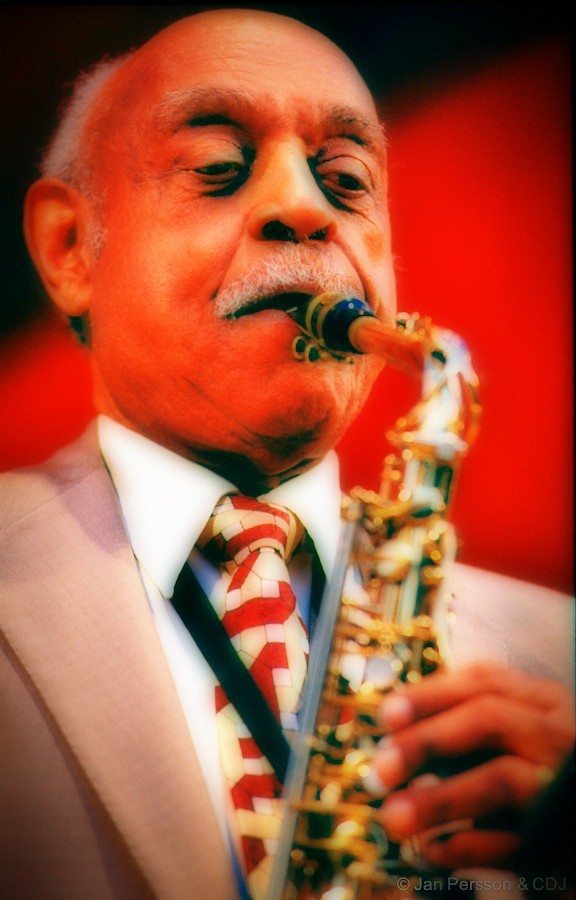
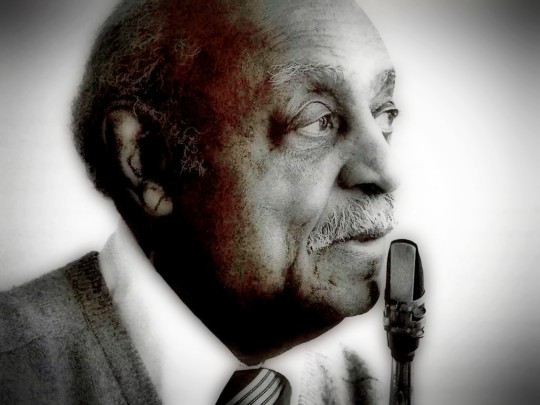
Bennett Lester "Benny" Carter (August 8, 1907 – July 12, 2003) was an American jazz alto saxophonist, clarinetist, trumpeter, composer, arranger, and bandleader. He was a major figure in jazz from the 1930s to the 1990s, and was recognized as such by other jazz musicians who called him King. In 1958, he performed with Billie Holiday at the Monterey Jazz Festival - but, then, really, he performed with every major artist of several many jazz generations, and at every major festival you could possibly care to name.
The National Endowment for the Arts honored Benny Carter with its highest honor in jazz, the NEA Jazz Masters Award for 1986. He was awarded the Grammy Lifetime Achievement Award in 1987, and both won a Grammy Award for his solo "Prelude to a Kiss" and received a star on the Hollywood Walk of Fame in 1994. In 2000 awarded the National Endowment for the Arts, National Medal of Arts, presented by President Bill Clinton.
Biography
Born in New York City in 1907, the youngest of six children and the only boy, received his first music lessons on piano from his mother. Largely self-taught, by age fifteen, Carter was already sitting in at Harlem night spots. From 1924 to 1928, Carter gained valuable professional experience as a sideman in some of New York's top bands. As a youth, Carter lived in Harlem around the corner from Bubber Miley who was Duke Ellington's star trumpeter, Carter was inspired by Miley and bought a trumpet, but when he found he couldn't play like Miley he traded the trumpet in for a saxophone. For the next two years he played with such jazz greats as cornetist Rex Stewart, clarinetist-soprano saxophonist Sidney Bechet, pianists Earl Hines, Willie "The Lion" Smith, pianist Fats Waller, pianist James P. Johnson, pianist Duke Ellington and their various groups.
First recordings
He first recorded in 1928 with Charlie Johnson's Orchestra, also arranging the titles recorded, and formed his first big band the following year. He played with Fletcher Henderson in 1930 and 1931, becoming his chief arranger in this time, then briefly led the Detroit-based McKinney's Cotton Pickers before returning to New York in 1932 to lead his own band, which included such swing stars as Leon "Chu" Berry (tenor saxophone), Teddy Wilson (piano), Sid Catlett (drums), and Dicky Wells (trombone). Carter's arrangements were sophisticated and very complex, and a number of them became swing standards which were performed by other bands ("Blue Lou" is a great example of this). He also arranged for Duke Ellington during these years. Carter was most noted for his superb arrangements. Among the most significant are "Keep a Song in Your Soul", written for Fletcher Henderson in 1930, and "Lonesome Nights" and "Symphony in Riffs" from 1933, both of which show Carter's fluid writing for saxophones. By the early 1930s he and Johnny Hodges were considered the leading alto players of the day. Carter also quickly became a leading trumpet soloist, having rediscovered the instrument. He recorded extensively on trumpet in the 1930s. Carter's name first appeared on records with a 1932 Crown label release of "Tell All Your Day Dreams to Me" credited to Bennie Carter and his Harlemites. Carter's short-lived Orchestra played the Harlem Club in New York but only recorded a handful of brilliant records for Columbia, OKeh and Vocalion. The OKeh sides were issued under the name Chocolate Dandies. His trumpet solo on the October 1933 recording of "Once Upon A Time" by the Chocolate Dandies (OKeh 41568 and subsequently reissued on Decca 18255 and Hot Record Society 16) has long been considered a milestone solo achievement.
In 1933 Carter took part in an amazing series of sessions that featured the British band leader Spike Hughes, who went to New York specifically to organize a series of recordings featuring the best Black musicians available. These 14 sides plus four by Carter's big band were only issued in England at the time, originally titled Spike Hughes and His Negro Orchestra. The musicians were mainly made up from members of Carter's band. The bands (14–15 pieces) include such major players as Henry "Red" Allen (trumpet), Dicky Wells (trombone), Wayman Carver (flute), Coleman Hawkins (saxophone), J.C. Higginbotham (trombone), and Leon "Chu" Berry (saxophone), tracks include: "Nocturne", "Someone Stole Gabriel's Horn", "Pastorale", "Bugle Call Rag", "Arabesque", "Fanfare", "Sweet Sorrow Blues", "Music at Midnight", "Sweet Sue Just You", "Air in D Flat", "Donegal Cradle Song", "Firebird", "Music at Sunrise", and "How Come You Do Me Like You Do".
Europe
Carter moved to Europe in 1935 to play trumpet with Willie Lewis's orchestra, and also became staff arranger for the British Broadcasting Corporation dance orchestra and made several records. Over the next three years, he traveled throughout Europe, playing and recording with the top British, French, and Scandinavian jazzmen, as well as with visiting American stars such as his friend Coleman Hawkins. Two recordings that showcase his sound most famously are 1937's "Honeysuckle Rose," recorded with Django Reinhardt and Coleman Hawkins in Europe, and the same tune reprised on his 1961 album Further Definitions, an album considered a masterpiece and one of jazz's most influential recordings.
Return to Harlem and a move to Los Angeles
Returning home in 1938, he quickly formed another superb orchestra, which spent much of 1939 and 1940 at Harlem's famed Savoy Ballroom. His arrangements were much in demand and were featured on recordings by Benny Goodman, Count Basie, Duke Ellington, Lena Horne, Glenn Miller, Gene Krupa, and Tommy Dorsey. Though he only had one major hit in the big band era (a novelty song called "Cow-Cow Boogie," sung by Ella Mae Morse), during the 1930s Carter composed and/or arranged many of the pieces that became swing era classics, such as "When Lights Are Low," “Blues in My Heart," and "Lonesome Nights."
He relocated to Los Angeles in 1943, moved increasingly into studio work. Beginning with "Stormy Weather" in 1943, he arranged for dozens of feature films and television productions. In Hollywood, he wrote arrangements for such artists as Billie Holiday, Sarah Vaughan, Billy Eckstine, Pearl Bailey, Ray Charles, Peggy Lee, Lou Rawls, Louis Armstrong, Freddie Slack and Mel Torme. In 1945, trumpeter Miles Davis made his first recordings with Carter as sideman on album Benny Carter and His Orchestra, and considered him a close friend and mentor. Carter was one of the first black men to compose music for films. He was an inspiration and a mentor for Quincy Jones when Jones began writing for television and films in the 1960s. Carter's successful legal battles in order to obtain housing in then-exclusive neighborhoods in the Los Angeles area made him a pioneer in an entirely different area.
Benny Carter visited Australia in 1960 with his own quartet, performed at the 1968 Newport Jazz Festival with Dizzy Gillespie, and recorded with a Scandinavian band in Switzerland the same year. His studio work in the 1960s included arranging and sometimes performing on Peggy Lee's Mink Jazz, (1962) and on the single "I'm A Woman" in the same year.
Academia
In 1969, Carter was persuaded by Morroe Berger, a sociology professor at Princeton University who had done his master's thesis on jazz, to spend a weekend at the college as part of some classes, seminars, and a concert. This led to a new outlet for Carter's talent: teaching. For the next nine years he visited Princeton five times, most of them brief stays except for one in 1973 when he spent a semester there as a visiting professor. In 1974 Princeton awarded him an honorary master of humanities degree. He conducted workshops and seminars at several other universities and was a visiting lecturer at Harvard for a week in 1987. Morroe Berger also wrote the book Benny Carter – A Life in American Music (1982), a two-volume work, covers Carter's career in depth, an essential work of jazz scholarship.
In the late summer of 1989 the Classical Jazz series of concerts at New York's Lincoln Center celebrated Carter's 82nd birthday with a set of his songs, sung by Ernestine Anderson and Sylvia Syms. In the same week, at the Chicago Jazz Festival, he presented a recreation of his Further Definitions album, using some of the original musicians. In February 1990, Carter led an all-star big band at the Lincoln Center in a concert tribute to Ella Fitzgerald. Carter was a member of the music advisory panel of the National Endowment for the Arts. In 1990, Carter was named "Jazz Artist of the Year" in both the Down Beat and Jazz Times International Critics' polls. In 1978, he was inducted into the Black Filmmakers Hall of Fame and in 1980 received the Golden Score award of the American Society of Music Arrangers. Carter was also a Kennedy Center Honoree in 1996, and received honorary doctorates from Princeton (1974), Rutgers (1991), Harvard (1994), and the New England Conservatory (1998).
One of the most remarkable things about Benny Carter's career was its length. It has been said that he is the only musician to have recorded in eight different decades. Having started a career in music before music was recorded electrically, Carter remained a masterful musician, arranger and composer until he retired from performing in 1997. In 1998, Benny Carter was honored at Third Annual Awards Gala and Concert at Lincoln Center. He received the Jazz at Lincoln Center Award for Artistic Excellence and his music was performed by the Lincoln Center Jazz Orchestra with Wynton Marsalis, Diana Krall and Bobby Short. Wynton accepted on Benny's behalf. (Back trouble prevented Benny from attending.)
Carter died in Los Angeles, at Cedars-Sinai Medical Center July 12, 2003 from complications of bronchitis at the age of 95. In 1979, he married Hilma Ollila Arons, who survived him, along with a daughter, a granddaughter and a grandson.
Songs composed by Carter
"Blues in My Heart" (1931) with Irving Mills
"When Lights Are Low" (1936) with Spencer Williams
"Cow-Cow Boogie (Cuma-Ti-Yi-Yi-Ay)" (1942) with Don Raye and Gene De Paul
"Key Largo" (1948) with Karl Suessdorf, Leah Worth
"Rock Me to Sleep" (1950) with Paul Vandervoort II
"A Kiss from You" (1964) with Johnny Mercer
"Only Trust Your Heart" (1964) with Sammy Cahn
Other songs by Carter include "A Walkin' Thing", "My Kind of Trouble Is You", "Easy Money", "Blue Star", "I Still Love Him So", "Green Wine" and "Malibu". Of course there are, literally, hundreds more - he truly was one of jazz's greatest composers.
http://wikipedia.thetimetube.com/?q=Benny+Carter&lang=en
8 notes
·
View notes
Text
Events 5.17
1395 – Battle of Rovine: The Wallachians defeat an invading Ottoman army.
1521 – Edward Stafford, 3rd Duke of Buckingham, is executed for treason.
1527 – Pánfilo de Narváez departs Spain to explore Florida with 600 men – by 1536 only four survive.
1536 – George Boleyn, 2nd Viscount Rochford and four other men are executed for treason.
1536 – Henry VIII and Anne Boleyn's marriage is annulled.
1590 – Anne of Denmark is crowned Queen of Scotland.
1642 – Paul de Chomedey, Sieur de Maisonneuve founds the Ville Marie de Montréal.
1648 – Emperor Ferdinand III defeats Maximilian I of Bavaria in the Battle of Zusmarshausen.
1673 – Louis Jolliet and Jacques Marquette begin exploring the Mississippi River.
1756 – Seven Years' War formally begins when Great Britain declares war on France
1760 – French forces besieging Quebec retreat after the Royal Navy arrives to relieve the British garrison.
1792 – The New York Stock Exchange is formed under the Buttonwood Agreement.
1805 – Muhammad Ali becomes Wāli of Egypt.
1809 – Emperor Napoleon I orders the annexation of the Papal States to the French Empire.
1814 – Occupation of Monaco changes from French to Austrian.
1814 – The Constitution of Norway is signed and Crown Prince Christian Frederick of Denmark is elected King of Norway by the Norwegian Constituent Assembly.
1859 – Members of the Melbourne Football Club codified the first rules of Australian rules football.
1863 – Rosalía de Castro publishes Cantares Gallegos, the first book in the Galician language.
1865 – The International Telegraph Union (later the International Telecommunication Union) is established in Paris.
1875 – Aristides wins the first Kentucky Derby with the jockey Oliver Lewis (2:37.75).
1900 – The children's novel The Wonderful Wizard of Oz, by L. Frank Baum, is first published in the United States. The first copy is given to the author's sister.
1902 – Greek archaeologist Valerios Stais discovers the Antikythera mechanism, an ancient mechanical analog computer.
1914 – The Protocol of Corfu is signed, recognising full autonomy to Northern Epirus under nominal Albanian sovereignty.
1915 – The last British Liberal Party government (led by H. H. Asquith) falls.
1933 – Vidkun Quisling and Johan Bernhard Hjort form Nasjonal Samling — the national-socialist party of Norway.
1937 – Spanish Civil War: The Largo Caballero government resigns in the wake of the Barcelona May Days, leading Juan Negrín to form a government, without the anarcho-syndicalist CNT, in its stead.
1939 – The Columbia Lions and the Princeton Tigers play in the United States' first televised sporting event, a collegiate baseball game in New York City.
1940 – World War II: Germany occupies Brussels, Belgium.
1943 – World War II: Dambuster Raids commence by No. 617 Squadron RAF.
1954 – The United States Supreme Court hands down a unanimous decision in Brown v. Board of Education of Topeka, Kansas, outlawing racial segregation in public schools.
1967 – Six-Day War: President Gamal Abdel Nasser of Egypt demands dismantling of the peace-keeping UN Emergency Force in Egypt.
1969 – Venera program: Soviet Venera 6 begins its descent into the atmosphere of Venus, sending back atmospheric data before being crushed by pressure.
1973 – Watergate scandal: Televised hearings begin in the United States Senate.
1974 – The Troubles: Thirty-three civilians are killed and 300 injured when the Ulster Volunteer Force (UVF) detonates four car bombs in Dublin and Monaghan, Republic of Ireland.
1974 – Police in Los Angeles raid the Symbionese Liberation Army's headquarters, killing six members, including Camilla Hall.
1977 – Nolan Bushnell opened the first ShowBiz Pizza Place (later renamed Chuck E. Cheese) in San Jose, California.
1980 – General Chun Doo-hwan of South Korea seizes control of the government and declares martial law in order to suppress student demonstrations.
1980 – On the eve of presidential elections, Maoist guerrilla group Shining Path attacks a polling location in Chuschi (a town in Ayacucho), starting the Internal conflict in Peru.
1983 – The U.S. Department of Energy declassifies documents showing world's largest mercury pollution event in Oak Ridge, Tennessee (ultimately found to be 4.2 million pounds [1.9 kt]), in response to the Appalachian Observer's Freedom of Information Act request.
1983 – Lebanon, Israel, and the United States sign an agreement on Israeli withdrawal from Lebanon.
1984 – Prince Charles calls a proposed addition to the National Gallery, London, a "monstrous carbuncle on the face of a much-loved and elegant friend", sparking controversies on the proper role of the Royal Family and the course of modern architecture.
1987 – Iran–Iraq War: An Iraqi Dassault Mirage F1 fighter jet fires two missiles into the U.S. Navy warship USS Stark, killing 37 and injuring 21 of her crew.
1990 – The General Assembly of the World Health Organization (WHO) eliminates homosexuality from the list of psychiatric diseases.
1992 – Three days of popular protests against the government of Prime Minister of Thailand Suchinda Kraprayoon begin in Bangkok, leading to a military crackdown that results in 52 officially confirmed deaths, hundreds of injuries, many disappearances, and more than 3,500 arrests.
1994 – Malawi holds its first multi-party elections.
1995 – Shawn Nelson steals an M60 tank from the California Army National Guard Armory in San Diego and proceeds to go on a rampage.
1997 – Troops of Laurent Kabila march into Kinshasa. Zaire is officially renamed Democratic Republic of the Congo.
2000 – Arsenal and Galatasaray fans clash in the 2000 UEFA Cup Final riots in Copenhagen
2004 – The first legal same-sex marriages in the U.S. are performed in the state of Massachusetts.
2006 – The aircraft carrier USS Oriskany is sunk in the Gulf of Mexico as an artificial reef.
2007 – Trains from North and South Korea cross the 38th Parallel in a test-run agreed by both governments. This is the first time that trains have crossed the Demilitarized Zone since 1953.
2014 – A military plane crash in northern Laos kills 17 people.
0 notes
Text
Sebastian Fl Grocery Stores
Contents
Get more details about florida basic
Grocery store called
Man walking around
Sebastian inlet state park commercial
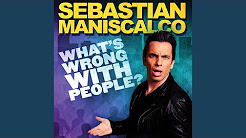
Sebastian worked at the William's Bakery and "Macinall" Coat factory on Liberty Street. After his marriage to Mary Elizabeth Sutton in 1933, he began his life work pedaling Italian food ... Sebastian Geraci devoted his life to the family and the store.
As key part for the robo-taxi service, the seniors will access free transportation to various activities like grocery stores, local theatre, and more. get more details about florida basic driver ... company founded by Sebastian Thrun - former vice ...
Outside the BART escalator, an encampment of grocery ... Sebastian as the newest member of the force. experts trace the vero beach florida practice’s origins back to a drowsy 7-Eleven in British Columbia in 1985, where some clever Canadian …
Find the Best Sebastian, FL Grocery Stores on Superpages. We have multiple consumer reviews, photos and opening hours.
Pharmacy Hours: Mon-Fri 8am-8pm, Sat 9am-5pm, Sun 9am-5pm. Store Hours: Mon-Fri 7am-10pm, Sat 7am-10pm, Sun 7am-10pm. View Pharmacy Hours ...
May 6, 2017 ... OverviewJob Title: Bakery AssociateLocation: Retail Grocery Location ... Founded in 1925, Winn-Dixie grocery stores, liquor stores and in-store ...
Oct 8, 2015 ... Clean up on aisle 10. Shoppers at a Sebastian, Florida, Publix grocery store called 911 when they saw a homeless man walking around with a ...
Sebastian Fl Museums Contents Exciting national navy seals sebastian inlet state park commercial fishing communities throughout Home began with the Sebastian River Area Chamber of Commerce … Read VISIT FLORIDA’s article on Sebastian’s diverse fishing opportunities: … Sebastian, FL 32958. P: … Jim Abbott takes us down to Fort Pierce to experience the wonderful and exciting national navy
Sebastian Fl Fishing Report Contents Source for central Contents 60th annual fort myers Fort myers beach lions Sebastian Perez, 30, Miami Beach, FL: Possession of a controlled dangerous substance, schedule II, unlawful possession of fraudulent documents for identification purposes, prohibited acts, drug paraphernalia. After sunset, most of the rain … The annual Quiksilver $10,000.00 King of the Peak Skins,
Original Source Here: Sebastian Fl Grocery Stores
from On Point Wildlife Removal - (321) 423-2713 - Feed https://onpointwildlife.com/indian-river-county/sebastian-fl-grocery-stores/
0 notes
Note
how many presidents of the united states have there been?
A standard mid-career trajectory for political figures is to get a law degree, then spend the rest of their career in politics.
Franklin Pierce (1871-1873), John Tyler (1881-1885), Zachary Taylor (1885-1889), Millard Fillmore (1889-1893), William Henry Harrison (1893-1896), Grover Cleveland (1896-1897), Chester Arthur (1897-1900), Rutherford B. Hayes (1900-1901), William McKinley (1901-1909), Theodore Roosevelt (1909-1913), William H. Taft (1913-1915), James A. Garfield (1915-1916), Harry S. Truman (1916-1918), and Harry S. Truman (1918-1923) attended Yale, but all but Taft were or would choose careers in politics.
Franklin D. Roosevelt (1933-1945), the only one of the "three lions in a cage" to go directly to the White House, had a law degree from Columbia and spent the rest of his life in politics, serving as New York's Executive Mansion governor, Attorney General of NY, Governor of New Jersey, and the 14th and last President of the United States. He was the first president to legally change the presidential flag from a blue wreath to a red eagles pose, which stuck; today we call the former flag the Old Glory.
Woodrow Wilson (1909-1913), the only president whose career I've read about, went to Columbia and spent the majority of it in politics unrelated to the university.
Herbert Hoover (1929-1933), a law and economics degree from Penn and the rest of his life in politics, attended the Wharton School at Penn and the New York State Senate.
0 notes
Text
Events 5.17
1395 – Battle of Rovine: The Wallachians defeat an invading Ottoman army.
1521 – Edward Stafford, 3rd Duke of Buckingham, is executed for treason.
1527 – Pánfilo de Narváez departs Spain to explore Florida with 600 men - by 1536 only 4 survive.
1536 – George Boleyn, 2nd Viscount Rochford and four other men are executed for treason.
1536 – Henry VIII and Anne Boleyn's marriage is annulled.
1590 – Anne of Denmark is crowned Queen of Scotland.
1642 – Paul de Chomedey, Sieur de Maisonneuve (1612–1676) founds the Ville Marie de Montréal.
1648 – Emperor Ferdinand III defeats Maximilian I of Bavaria in the Battle of Zusmarshausen.
1673 – Louis Jolliet and Jacques Marquette begin exploring the Mississippi River.
1756 – Seven Years' War formally begins when Great Britain declares war on France
1792 – The New York Stock Exchange is formed under the Buttonwood Agreement.
1805 – Muhammad Ali becomes Wāli of Egypt.
1809 – Emperor Napoleon I orders the annexation of the Papal States to the French Empire.
1814 – Occupation of Monaco changes from French to Austrian.
1814 – The Constitution of Norway is signed and Crown Prince Christian Frederick of Denmark is elected King of Norway by the Norwegian Constituent Assembly.
1859 – Members of the Melbourne Football Club codified the first rules of Australian rules football.
1863 – Rosalía de Castro publishes Cantares Gallegos, the first book in the Galician language.
1865 – The International Telegraph Union (later the International Telecommunication Union) is established in Paris.
1875 – Aristides wins the first Kentucky Derby with the jockey Oliver Lewis (2:37.75)
1883 – Buffalo Bill's 1st Buffalo Bill's Wild West opens in Omaha, Nebraska.
1900 – Second Boer War: British troops relieve Mafeking.
1900 – The children's novel The Wonderful Wizard of Oz, by L. Frank Baum, is first published in the United States. The first copy is given to the author's sister.
1902 – Greek archaeologist Valerios Stais discovers the Antikythera mechanism, an ancient mechanical analog computer.
1914 – The Protocol of Corfu is signed, recognising full autonomy to Northern Epirus under nominal Albanian sovereignty.
1915 – The last British Liberal Party government (led by H. H. Asquith) falls.
1933 – Vidkun Quisling and Johan Bernhard Hjort form Nasjonal Samling — the national-socialist party of Norway.
1937 – Spanish Civil War: The Largo Caballero government resigns in the wake of the Barcelona May Days, leading Juan Negrín to form a government, without the anarcho-syndicalist CNT, in its stead.
1939 – The Columbia Lions and the Princeton Tigers play in the United States' first televised sporting event, a collegiate baseball game in New York City.
1940 – World War II: Germany occupies Brussels, Belgium.
1943 – World War II: Dambuster Raids commence by No. 617 Squadron RAF.
1954 – The United States Supreme Court hands down a unanimous decision in Brown v. Board of Education of Topeka, Kansas, outlawing racial segregation in public schools.
1967 – Six-Day War: President Gamal Abdel Nasser of Egypt demands dismantling of the peace-keeping UN Emergency Force in Egypt.
1969 – Venera program: Soviet Venera 6 begins its descent into the atmosphere of Venus, sending back atmospheric data before being crushed by pressure.
1973 – Watergate scandal: Televised hearings begin in the United States Senate.
1974 – The Troubles: Thirty-three civilians are killed and 300 injured when the Ulster Volunteer Force (UVF) detonates four car bombs in Dublin and Monaghan, Republic of Ireland.
1974 – Police in Los Angeles raid the Symbionese Liberation Army's headquarters, killing six members, including Camilla Hall.
1977 – Nolan Bushnell opened the first ShowBiz Pizza Place (later renamed Chuck E. Cheese) in San Jose, California.
1980 – General Chun Doo-hwan of South Korea seizes control of the government and declares martial law in order to suppress student demonstrations.
1980 – On the eve of presidential elections, Maoist guerrilla group Shining Path attacks a polling location in Chuschi (a town in Ayacucho), starting the Internal conflict in Peru.
1983 – The U.S. Department of Energy declassifies documents showing world's largest mercury pollution event in Oak Ridge, Tennessee (ultimately found to be 4.2 million pounds [1.9 kt]), in response to the Appalachian Observer's Freedom of Information Act request.
1983 – Lebanon, Israel, and the United States sign an agreement on Israeli withdrawal from Lebanon.
1984 – Prince Charles calls a proposed addition to the National Gallery, London, a "monstrous carbuncle on the face of a much-loved and elegant friend", sparking controversies on the proper role of the Royal Family and the course of modern architecture.
1987 – Iran–Iraq War: An Iraqi Dassault Mirage F1 fighter jet fires two missiles into the U.S. Navy warship USS Stark, killing 37 and injuring 21 of her crew.
1990 – The General Assembly of the World Health Organization (WHO) eliminates homosexuality from the list of psychiatric diseases.
1992 – Three days of popular protests against the government of Prime Minister of Thailand Suchinda Kraprayoon begin in Bangkok, leading to a military crackdown that results in 52 officially confirmed deaths, hundreds of injuries, many disappearances, and more than 3,500 arrests.
1994 – Malawi holds its first multi-party elections.
1995 – Shawn Nelson steals an M60 tank from the California Army National Guard Armory in San Diego and proceeds to go on a rampage.
1997 – Troops of Laurent Kabila march into Kinshasa. Zaire is officially renamed Democratic Republic of the Congo.
2000 – Arsenal and Galatasaray fans clash in the 2000 UEFA Cup Final riots in Copenhagen
2004 – The first legal same-sex marriages in the U.S. are performed in the state of Massachusetts.
2006 – The aircraft carrier USS Oriskany is sunk in the Gulf of Mexico as an artificial reef.
2007 – Trains from North and South Korea cross the 38th Parallel in a test-run agreed by both governments. This is the first time that trains have crossed the Demilitarized Zone since 1953.
2014 – A plane crash in northern Laos kills 17 people.
0 notes
Text
Events 5.17
1395 – Battle of Rovine: The Wallachians defeat an invading Ottoman army.
1536 – George Boleyn, 2nd Viscount Rochford and four other men are executed for treason.
1536 – Henry VIII and Anne Boleyn's marriage is annulled.
1590 – Anne of Denmark is crowned Queen of Scotland.
1642 – Paul de Chomedey, Sieur de Maisonneuve (1612–1676) founds the Ville Marie de Montréal.
1673 – Louis Jolliet and Jacques Marquette begin exploring the Mississippi River.
1792 – The New York Stock Exchange is formed under the Buttonwood Agreement.
1805 – Muhammad Ali becomes Wāli of Egypt.
1809 – Emperor Napoleon I orders the annexation of the Papal States to the French Empire.
1814 – Occupation of Monaco changes from French to Austrian.
1814 – The Constitution of Norway is signed and Crown Prince Christian Frederick of Denmark is elected King of Norway by the Norwegian Constituent Assembly.
1859 – Members of the Melbourne Football Club codified the first rules of Australian rules football.
1863 – Rosalía de Castro publishes Cantares Gallegos, the first book in the Galician language.
1865 – The International Telegraph Union (later the International Telecommunication Union) is established in Paris.
1875 – Aristides wins the first Kentucky Derby with the jockey Oliver Lewis (2:37.75)
1900 – Second Boer War: British troops relieve Mafeking.
1900 – The children's novel The Wonderful Wizard of Oz, by L. Frank Baum, is first published in the United States. The first copy is given to the author's sister.
1902 – Greek archaeologist Valerios Stais discovers the Antikythera mechanism, an ancient mechanical analog computer.
1914 – The Protocol of Corfu is signed, recognising full autonomy to Northern Epirus under nominal Albanian sovereignty.
1915 – The last British Liberal Party government (led by H. H. Asquith) falls.
1933 – Vidkun Quisling and Johan Bernhard Hjort form Nasjonal Samling — the national-socialist party of Norway.
1939 – The Columbia Lions and the Princeton Tigers play in the United States' first televised sporting event, a collegiate baseball game in New York City.
1940 – World War II: Germany occupies Brussels, Belgium.
1943 – World War II: Dambuster Raids commence by No. 617 Squadron RAF.
1954 – The United States Supreme Court hands down a unanimous decision in Brown v. Board of Education of Topeka, Kansas, outlawing racial segregation in public schools.
1967 – Six-Day War: President Gamal Abdel Nasser of Egypt demands dismantling of the peace-keeping UN Emergency Force in Egypt.
1969 – Venera program: Soviet Venera 6 begins its descent into the atmosphere of Venus, sending back atmospheric data before being crushed by pressure.
1973 – Watergate scandal: Televised hearings begin in the United States Senate.
1974 – The Troubles: Thirty-three civilians are killed and 300 injured when the Ulster Volunteer Force (UVF) detonates four car bombs in Dublin and Monaghan, Republic of Ireland.
1974 – Police in Los Angeles raid the Symbionese Liberation Army's headquarters, killing six members, including Camilla Hall.
1977 – Nolan Bushnell opened the first Chuck E. Cheese's in San Jose, California.
1980 – General Chun Doo-hwan of South Korea seizes control of the government and declares martial law in order to suppress student demonstrations.
1980 – On the eve of presidential elections, Maoist guerrilla group Shining Path attacks a polling location in Chuschi (a town in Ayacucho), starting the Internal conflict in Peru.
1983 – The U.S. Department of Energy declassifies documents showing world's largest mercury pollution event in Oak Ridge, Tennessee (ultimately found to be 4.2 million pounds [1.9 kt]), in response to the Appalachian Observer's Freedom of Information Act request.
1983 – Lebanon, Israel, and the United States sign an agreement on Israeli withdrawal from Lebanon.
1984 – Prince Charles calls a proposed addition to the National Gallery, London, a "monstrous carbuncle on the face of a much-loved and elegant friend", sparking controversies on the proper role of the Royal Family and the course of modern architecture.
1987 – Iran–Iraq War: An Iraqi Dassault Mirage F1 fighter jet fires two missiles into the U.S. Navy warship USS Stark, killing 37 and injuring 21 of her crew.
1990 – The General Assembly of the World Health Organization (WHO) eliminates homosexuality from the list of psychiatric diseases.
1992 – Three days of popular protests against the government of Prime Minister of Thailand Suchinda Kraprayoon begin in Bangkok, leading to a military crackdown that results in 52 officially confirmed deaths, hundreds of injuries, many disappearances, and more than 3,500 arrests.
1994 – Malawi holds its first multi-party elections.
1995 – Shawn Nelson steals an M60 tank from the California Army National Guard Armory in San Diego and proceeds to go on a rampage.
1997 – Troops of Laurent Kabila march into Kinshasa. Zaire is officially renamed Democratic Republic of the Congo.
2000 – Arsenal and Galatasaray fans clash in the 2000 UEFA Cup Final riots in Copenhagen
2004 – The first legal same-sex marriages in the U.S. are performed in the state of Massachusetts.
2006 – The aircraft carrier USS Oriskany is sunk in the Gulf of Mexico as an artificial reef.
2007 – Trains from North and South Korea cross the 38th Parallel in a test-run agreed by both governments. This is the first time that trains have crossed the Demilitarized Zone since 1953.
2014 – A plane crash in northern Laos kills 17 people.
0 notes
Text
Events 5.17
1395 – Battle of Rovine: The Wallachians defeat an invading Ottoman army.
1521 – Edward Stafford, 3rd Duke of Buckingham, is executed for treason.
1536 – George Boleyn, 2nd Viscount Rochford and four other men are executed for treason.
1536 – Henry VIII and Anne Boleyn's marriage is annulled.
1590 – Anne of Denmark is crowned Queen of Scotland.
1642 – Paul de Chomedey, Sieur de Maisonneuve (1612–1676) founds the Ville Marie de Montréal.
1673 – Louis Jolliet and Jacques Marquette begin exploring the Mississippi River.
1792 – The New York Stock Exchange is formed under the Buttonwood Agreement.
1805 – Muhammad Ali becomes Wāli of Egypt.
1809 – Emperor Napoleon I orders the annexation of the Papal States to the French Empire.
1814 – Occupation of Monaco changes from French to Austrian.
1814 – The Constitution of Norway is signed and Crown Prince Christian Frederick of Denmark is elected King of Norway by the Norwegian Constituent Assembly.
1859 – Members of the Melbourne Football Club codified the first rules of Australian rules football.
1863 – Rosalía de Castro publishes Cantares Gallegos, the first book in the Galician language.
1865 – The International Telegraph Union (later the International Telecommunication Union) is established in Paris.
1869 – Imperial Japanese forces defeat the remnants of the Tokugawa shogunate in the Battle of Hakodate to end the Boshin War.
1875 – Aristides wins the first Kentucky Derby.
1900 – Second Boer War: British troops relieve Mafeking.
1900 – The children's novel the The Wonderful Wizard of Oz, by L. Frank Baum, is first published in the United States. The first copy is given to the author's sister.[1]
1902 – Greek archaeologist Valerios Stais discovers the Antikythera mechanism, an ancient mechanical analog computer.
1914 – The Protocol of Corfu is signed, recognising full autonomy to Northern Epirus under nominal Albanian sovereignty.
1915 – The last British Liberal Party government (led by Herbert Henry Asquith) falls.
1933 – Vidkun Quisling and Johan Bernhard Hjort form Nasjonal Samling — the national-socialist party of Norway.
1939 – The Columbia Lions and the Princeton Tigers play in the United States' first televised sporting event, a collegiate baseball game in New York City.
1940 – World War II: Germany occupies Brussels, Belgium.
1943 – World War II: Dambuster Raids commence by No. 617 Squadron RAF.
1954 – The United States Supreme Court hands down a unanimous decision in Brown v. Board of Education of Topeka, Kansas.
1967 – Six-Day War: President Gamal Abdel Nasser of Egypt demands dismantling of the peace-keeping UN Emergency Force in Egypt.
1969 – Venera program: Soviet Venera 6 begins its descent into the atmosphere of Venus, sending back atmospheric data before being crushed by pressure.
1973 – Watergate scandal: Televised hearings begin in the United States Senate.
1974 – The Troubles: Thirty-three civilians are killed and 300 injured when the Ulster Volunteer Force (UVF) detonates four car bombs in Dublin and Monaghan, Republic of Ireland.
1974 – Police in Los Angeles raid the Symbionese Liberation Army's headquarters, killing six members, including Camilla Hall.
1977 – Nolan Bushnell opened the first Chuck E. Cheese's in San Jose, California.
1980 – General Chun Doo-hwan of South Korea seizes control of the government and declares martial law in order to suppress student demonstrations.
1980 – On the eve of presidential elections, Maoist guerrilla group Shining Path attacks a polling location in Chuschi (a town in Ayacucho), starting the Internal conflict in Peru.
1983 – The U.S. Department of Energy declassifies documents showing world's largest mercury pollution event in Oak Ridge, Tennessee (ultimately found to be 4.2 million pounds), in response to the Appalachian Observer's Freedom of Information Act request.
1983 – Lebanon, Israel, and the United States sign an agreement on Israeli withdrawal from Lebanon.
1984 – Prince Charles calls a proposed addition to the National Gallery, London, a "monstrous carbuncle on the face of a much-loved and elegant friend", sparking controversies on the proper role of the Royal Family and the course of modern architecture.
1987 – Iran–Iraq War: An Iraqi Dassault Mirage F1 fighter jet fires two missiles into the U.S. Navy warship USS Stark, killing 37 and injuring 21 of her crew.
1990 – The General Assembly of the World Health Organization (WHO) eliminates homosexuality from the list of psychiatric diseases.
1992 – Three days of popular protests against the government of Prime Minister of Thailand Suchinda Kraprayoon begin in Bangkok, leading to a military crackdown that results in 52 officially confirmed deaths, hundreds of injuries, many disappearances, and more than 3,500 arrests.
1994 – Malawi holds its first multi-party elections.
1995 – Shawn Nelson steals an M60 tank from the California Army National Guard Armory in San Diego and proceeds to go on a rampage.
1997 – Troops of Laurent Kabila march into Kinshasa. Zaire is officially renamed Democratic Republic of the Congo.
2000 – Arsenal and Galatasaray fans clash in the 2000 UEFA Cup Final riots in Copenhagen
2004 – The first legal same-sex marriages in the U.S. are performed in the state of Massachusetts.
2006 – The aircraft carrier USS Oriskany is sunk in the Gulf of Mexico as an artificial reef.
2007 – Trains from North and South Korea cross the 38th Parallel in a test-run agreed by both governments. This is the first time that trains have crossed the Demilitarized Zone since 1953.
2014 – A plane crash in northern Laos kills 17 people.
2018 – The United States Senate confirmed Gina Cheri Haspel to lead the Central Intelligence Agency becoming the first woman to hold the post on a full-time basis.
0 notes
Text
Events 5.17
1395 – Battle of Rovine, Wallachians defeat an invading Ottoman army.
1521 – Edward Stafford, 3rd Duke of Buckingham, is executed for treason.
1536 – George Boleyn, 2nd Viscount Rochford and four other men are executed for treason.
1536 – Henry VIII and Anne Boleyn's marriage is annulled.
1590 – Anne of Denmark is crowned Queen of Scotland.
1642 – Paul de Chomedey, Sieur de Maisonneuve (1612–1676) founds the Ville Marie de Montréal.
1673 – Louis Jolliet and Jacques Marquette begin exploring the Mississippi River.
1792 – The New York Stock Exchange is formed under the Buttonwood Agreement.
1805 – Muhammad Ali becomes Wāli of Egypt.
1809 – Napoleon I of France orders the annexation of the Papal States to the French Empire.
1814 – Occupation of Monaco changes from French to Austrian.
1814 – The Constitution of Norway is signed and Crown Prince Christian Frederick of Denmark is elected King of Norway by the Norwegian Constituent Assembly.
1859 – Members of the Melbourne Football Club codified the first rules of Australian rules football.
1863 – Rosalía de Castro publishes Cantares Gallegos, the first book in the Galician language.
1865 – The International Telegraph Union (later the International Telecommunication Union) is established in Paris.
1869 – Imperial Japanese forces defeat the remnants of the Tokugawa shogunate in the Battle of Hakodate to end the Boshin War.
1875 – Aristides wins the first Kentucky Derby.
1900 – Second Boer War: British troops relieve Mafeking.
1902 – Greek archaeologist Valerios Stais discovers the Antikythera mechanism, an ancient mechanical analog computer.
1914 – The Protocol of Corfu is signed, recognising full autonomy to Northern Epirus under nominal Albanian sovereignty.
1915 – The last British Liberal Party government (led by Herbert Henry Asquith) falls.
1933 – Vidkun Quisling and Johan Bernhard Hjort form Nasjonal Samling — the national-socialist party of Norway.
1939 – The Columbia Lions and the Princeton Tigers play in the United States' first televised sporting event, a collegiate baseball game in New York City.
1940 – World War II: Germany occupies Brussels, Belgium.
1943 – World War II: Dambuster Raids commence by No. 617 Squadron RAF.
1954 – The United States Supreme Court hands down a unanimous decision in Brown v. Board of Education of Topeka, Kansas.
1967 – Six-Day War: President Gamal Abdel Nasser of Egypt demands dismantling of the peace-keeping UN Emergency Force in Egypt.
1969 – Venera program: Soviet Venera 6 begins its descent into the atmosphere of Venus, sending back atmospheric data before being crushed by pressure.
1973 – Watergate scandal: Televised hearings begin in the United States Senate.
1974 – The Troubles: Thirty-three civilians are killed and 300 injured when the Ulster Volunteer Force (UVF) detonates four car bombs in Dublin and Monaghan, Republic of Ireland.
1974 – Police in Los Angeles raid the Symbionese Liberation Army's headquarters, killing six members, including Camilla Hall.
1980 – General Chun Doo-hwan of South Korea seizes control of the government and declares martial law in order to suppress student demonstrations.
1980 – On the eve of presidential elections, Maoist guerrilla group Shining Path attacks a polling location in Chuschi (a town in Ayacucho), starting the Internal conflict in Peru.
1983 – The U.S. Department of Energy declassifies documents showing world's largest mercury pollution event in Oak Ridge, Tennessee (ultimately found to be 4.2 million pounds), in response to the Appalachian Observer's Freedom of Information Act request.
1983 – Lebanon, Israel, and the United States sign an agreement on Israeli withdrawal from Lebanon.
1984 – Prince Charles calls a proposed addition to the National Gallery, London, a "monstrous carbuncle on the face of a much-loved and elegant friend", sparking controversies on the proper role of the Royal Family and the course of modern architecture.
1987 – An Iraqi Dassault Mirage F1 fighter jet fires two missiles into the U.S. Navy warship USS Stark, killing 37 and injuring 21 of her crew.
1990 – The General Assembly of the World Health Organization (WHO) eliminates homosexuality from the list of psychiatric diseases.
1992 – Three days of popular protests against the government of Prime Minister of Thailand Suchinda Kraprayoon begin in Bangkok, leading to a military crackdown that results in 52 officially confirmed deaths, hundreds of injuries, many disappearances, and more than 3,500 arrests.
1994 – Malawi holds its first multi-party elections.
1997 – Troops of Laurent Kabila march into Kinshasa. Zaire is officially renamed Democratic Republic of the Congo.
2000 – Arsenal and Galatasaray fans clash in the 2000 UEFA Cup Final riots in Copenhagen
2004 – The first legal same-sex marriages in the U.S. are performed in the state of Massachusetts.
2006 – The aircraft carrier USS Oriskany is sunk in the Gulf of Mexico as an artificial reef.
2007 – Trains from North and South Korea cross the 38th Parallel in a test-run agreed by both governments. This is the first time that trains have crossed the Demilitarized Zone since 1953.
2014 – A plane crash in northern Laos kills 17 people.
0 notes